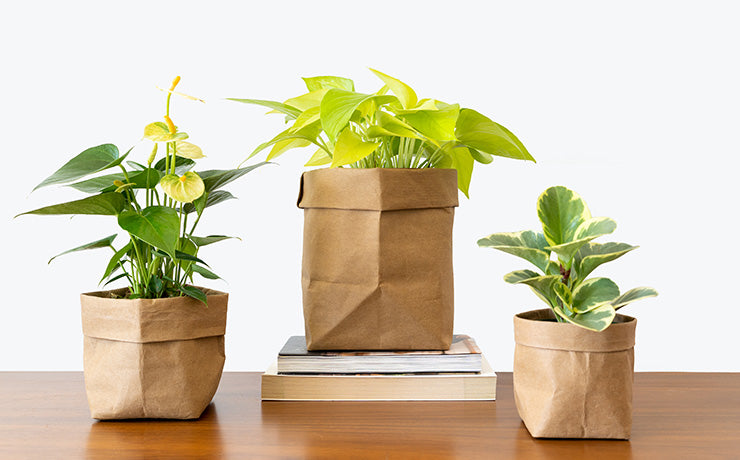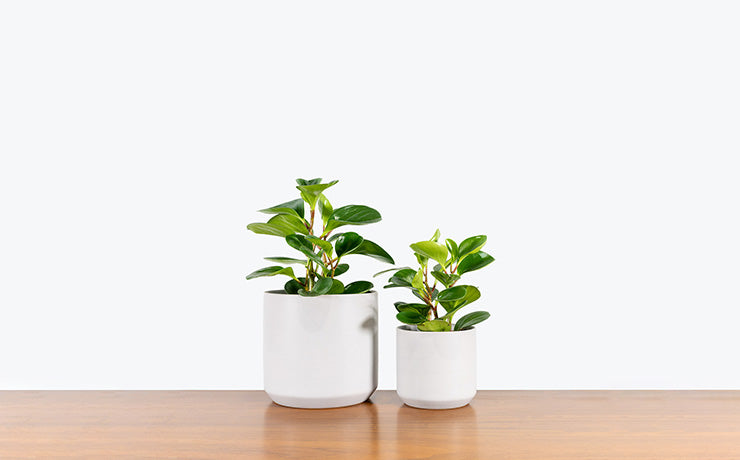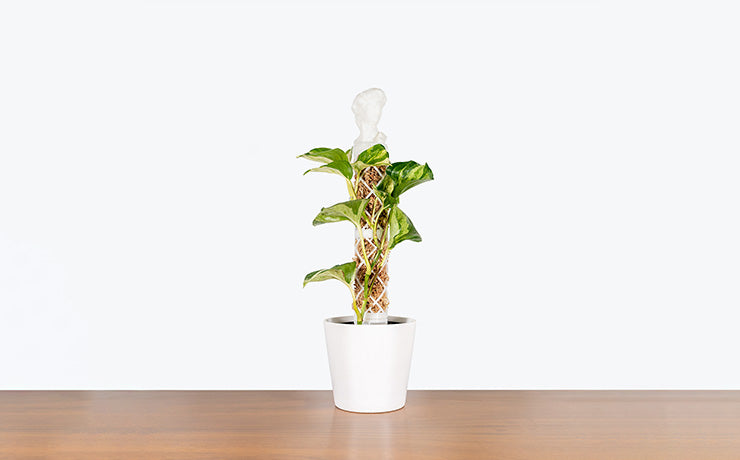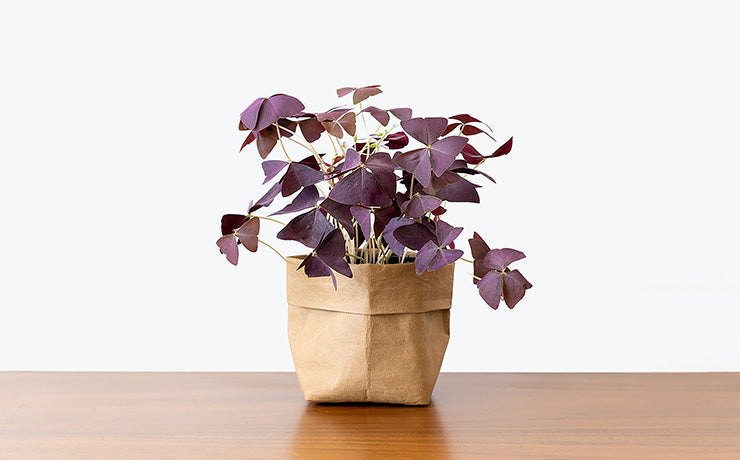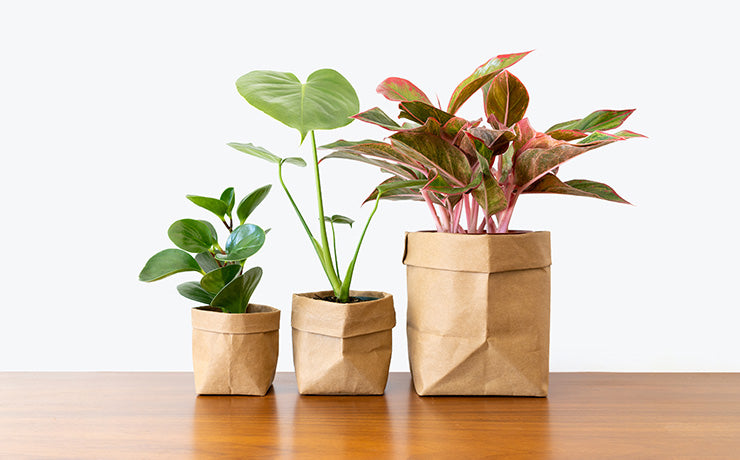Glossary
Plant Care Library
H
Hawaiian Palm
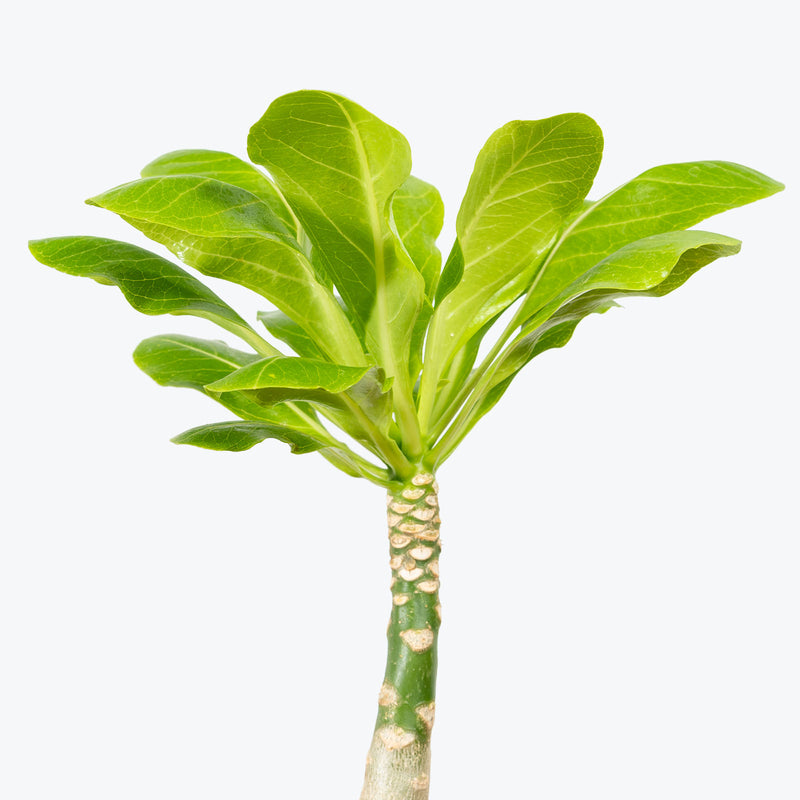
How to care for Hawaiian Palm
They should not be in a position to see the sun directly, although early morning or late evening sun is fine. Filtered sunlight through a sheer curtain is best and most homes are comprised primarily of indirect sunlight. The best spot for them is where they do not see the sun during the majority of the day but still get bright, indirect light.
They will do best in bright light. A nice bright place inside your home would be on the window sill or a stool that is right next to a window, either with or without blinds, depending on if the plant can handle sun. Remember that plants will grow based on how much light they receive.
They like the soil to be relatively dry before the next watering. That usually takes about 2 weeks in an average home environment. It will vary depending on the time of year, your environment and lighting conditions, but for them, it's always safer to underwater or water when you see signs of lack of water (i.e. droopy, floppy, or soft leaves). Expect to water more often in brighter light and less often in lower light.
They will do well in average humidity environments but will appreciate a little bit of humidity if provided, give them a mist daily or get a humidifier.
As Hawaiian Palms are actually succulents and not palms, they are pretty drought tolerant not like other palms, and only need to be watered when the soil is mostly dry. They do have a dormant period (usually in summer), and doesn't like change (being moved from one place to another) when leaves are shed, but this usually only lasts a couple of months and then new foliage will reappear.
You can feel comfortable having this plant around your home in the potential case where your pet feels like nibbling on it. However, we typically recommend keeping your pets from eating any of your houseplants..
Learn MoreView PlantHaworthia Succulent Mystery Box
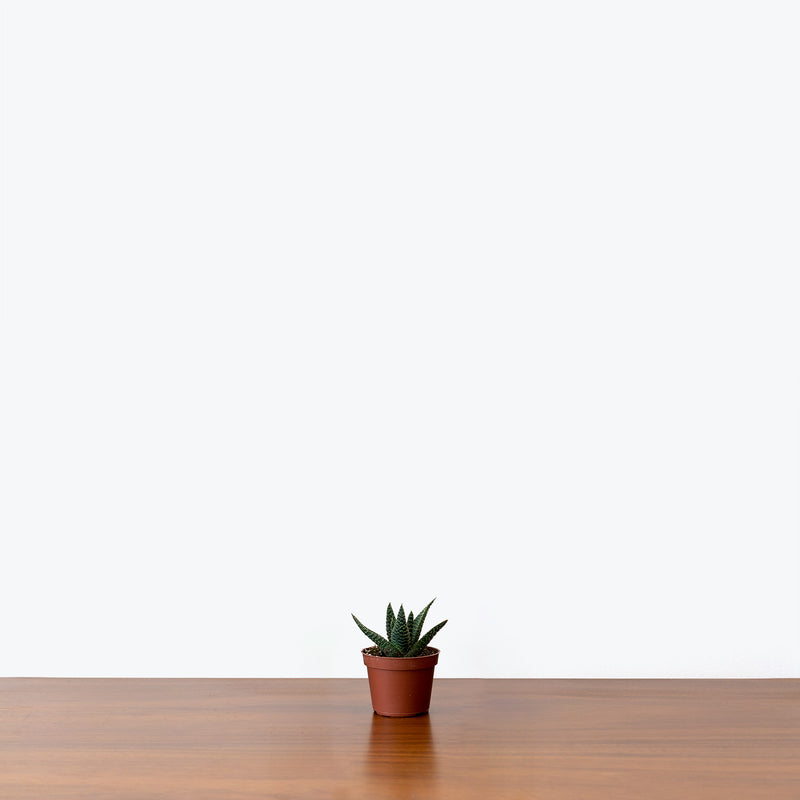
How to care for Haworthia Succulent Mystery Box
Haworthia Succulent enjoys some direct sun, but they'll also do well in bright, indirect light. It is best to place this plant somewhere where it will receive some nice morning sun, or a couple hours of afternoon sun, and then indirect light the rest of the day.
Haworthia Succulent will thrive in medium to bright light, but also can tolerate low light. A good medium-light place in your home would be in the middle of a room that has a regular size window. They can be placed almost anywhere in the room but remember, plants will grow based on how much light they receive.
Haworthia Succulent likes the soil to be completely dry before the next watering. That usually takes about 4 weeks in an average home environment. It will vary depending on the time of year, your environment and lighting conditions, but for them, it's always safer to underwater or water when you see signs of lack of water (i.e. wrinkly or soft leaves). Water a little more often in the warmer months!
Haworthia Succulent humidity requirement is low, so do not mist them or put them in an enclosed terrarium.
Haworthia Succulents are drought-tolerant and prefer to be under-watered. Not sure when to water? Wrinkles on the leaves are a telltale sign. If you want compact growth, keep the plant in very bright light!
You can feel comfortable having Haworthia Succulents around your home in the potential case where your pet feels like nibbling on it. However, we typically recommend keeping your pets from eating any of your houseplants..
Learn MoreView PlantHerb Garden Kit
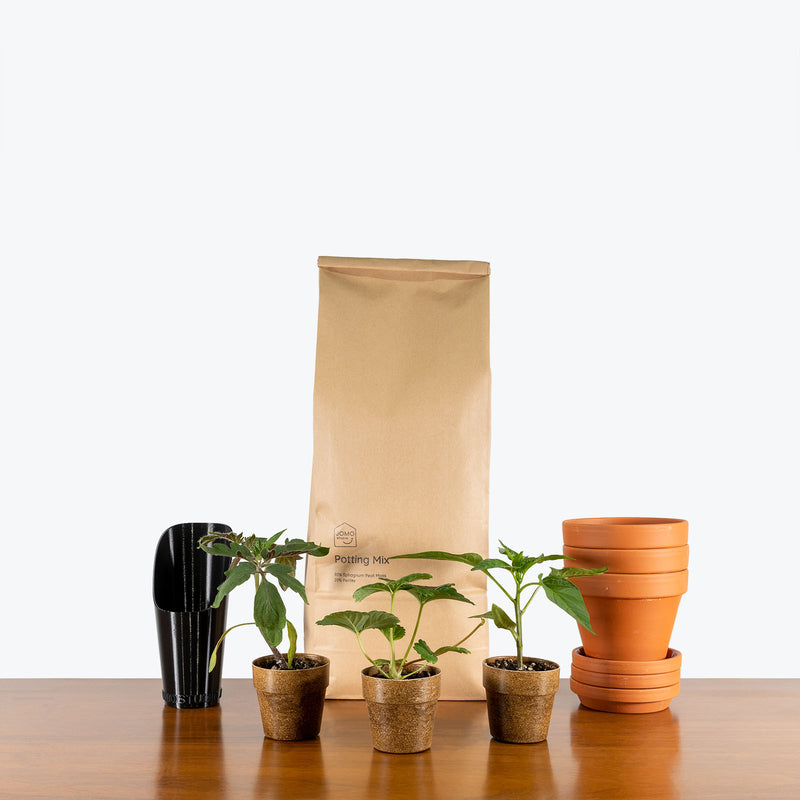
How to care for Herb Garden Kit
They love as much sun as possible. The best spot for them is where they can see the sun during the majority of the day.
They will do best in bright light. A nice bright place inside your home would be on the window sill or a stool that is right next to a window, either with or without blinds, depending on if the plant can handle sun. Remember that plants will grow based on how much light they receive.
They like the soil to stay consistently moist, but not soaking wet. Give them water whenever just the surface of the soil is starting to get dry. Expect to water more often in brighter light and less often in lower light.
They like a high humidity environment. Outdoors, this should happen naturally in the summer, but indoors, give them a mist daily or as often as possible. Alternatively, you can put them around a humidifier.
Use an organic, diluted, balanced, water-soluble fertilizer once every 3 weeks. Avoid over-fertilizing, as this will reduce the essential oils of the plant, which, in turn, will greatly reduce their flavour and aroma. Pinch and prune often! The more you harvest your herbs, using clean scissors or clippers, the more they will produce. Never remove more than 1/3 of the plant when harvesting though.
You can feel comfortable having this plant around your home in the potential case where your pet feels like nibbling on it. However, we typically recommend keeping your pets from eating any of your houseplants..
View PlantHibiscus
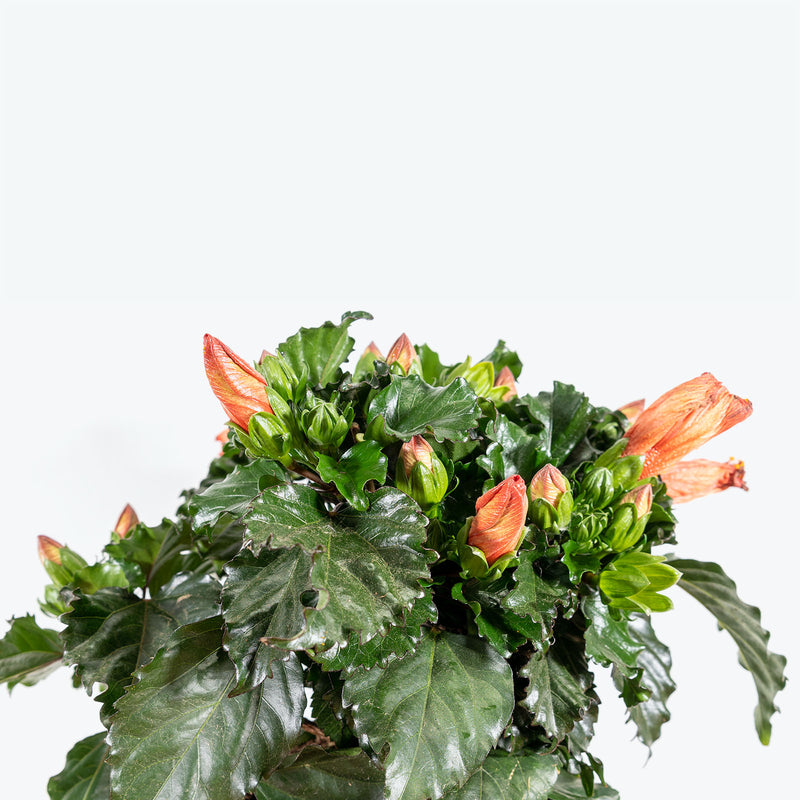
How to care for Hibiscus
They love as much heat and sun as possible. The best spot for them is where they can see the sun during the majority of the day.
They will do their best and flower profusely in bright light. A nice bright place outside would be on a sunny balcony, deck, or backyard; inside your home, it would do best in a sunny window sill. Remember that plants will grow and flower based on how much light they receive.
They like the soil to stay consistently moist, but not soaking wet. Give them water whenever just the top inch of the soil is starting to get dry. Expect to water more often in brighter light and less often in lower light. Water your plant before the leaves start to wilt because once this occurs, the plant becomes stressed and has less energy to flower, shedding the flowers currently on it.
They like a high humidity environment. Outdoors, this should happen naturally in the summer, but indoors, give them a mist daily or as often as possible. Alternatively, you can put them around a humidifier. Although they won't die if they don't receive enough humidity, their leaves may have some dry, crunchy, or yellow edges.
In order for them to bloom steadily, they truly need 6-8 hours of direct sunlight. Their stunning flowers will add pops of colour to your home, balcony, or yard. Fertilize every 2 weeks in the growing season with diluted, liquid fertilizer. Since they are relatively drought-tolerant, they are a great pick for busy or forgetful gardeners who may forget to water from time to time. To overwinter your plant, bring them inside and keep them in a window that receives sun all day, keeping the soil evenly moist but not soaking wet.
This plant is moderately toxic and can cause some adverse reactions when ingested so it is best to not let your pets eat it, which we advise for all plants in general. The severity of the reaction will depend on how much of the plant is ingested but, if you know your pet typically does not eat your plants, this plant will be suitable for your home..
View PlantHoliday Cactus
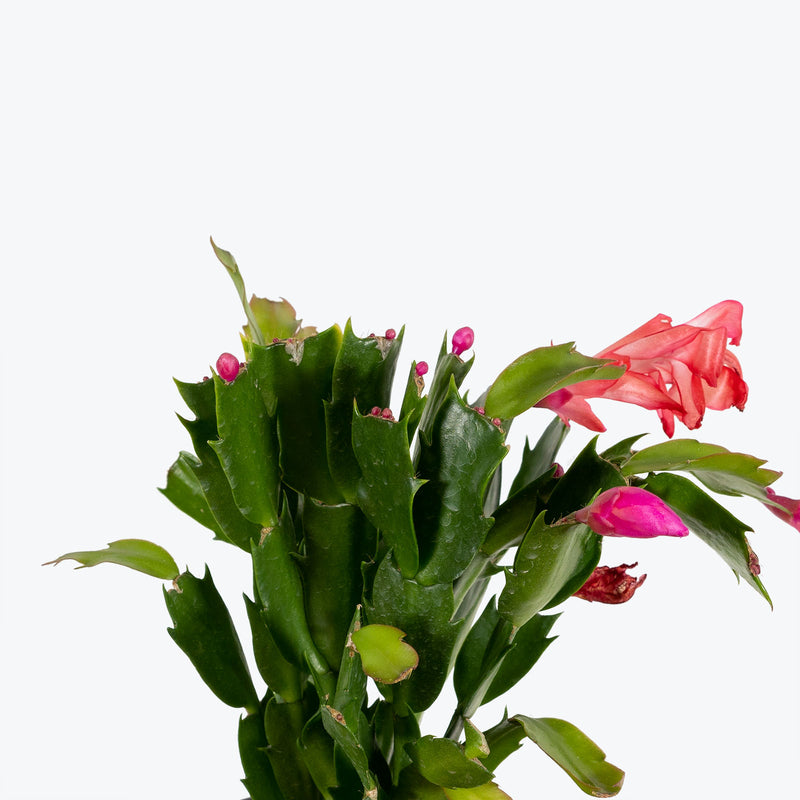
How to care for Holiday Cactus
They should not be in a position to see the sun directly, although early morning or late evening sun is fine. Filtered sunlight through a sheer curtain is best and most homes are comprised primarily of indirect sunlight. The best spot for them is where they do not see the sun during the majority of the day but still get bright, indirect light.
They will thrive in bright light, but also can tolerate medium light. A good medium-light place in your home would be in the middle of a room that has a regular size window. They can be placed anywhere between the middle of the room and the window. Remember that plants will grow based on how much light they receive.
They need to be watered when the top half of the soil is dry to the touch. That usually takes about 1 week in an average home environment. It will vary depending on the time of year, your environment and lighting conditions, but it's always safer to underwater or give the soil a check before you water again. Expect to water more often in brighter light and less often in lower light.
They will do well in average humidity environments but will appreciate a little bit of humidity if provided, give them a mist daily or get a humidifier.
They can handle some direct sunlight, but an East-facing window would be best because too much direct sunlight will bleach their leaves. Although they prefer brighter light, they will take dimmer locations as long as they can be given brighter light for at least a few months of the year - this will actually encourage them to flower. Once your plant has ceased flowering (or about 6-8 weeks before you want it to re-bloom), let it begin its dormancy by cutting back on moisture and reducing light and temperature.
You can feel comfortable having this plant around your home in the potential case where your pet feels like nibbling on it. However, we typically recommend keeping your pets from eating any of your houseplants..
Learn MoreView PlantHomalomena Camouflage
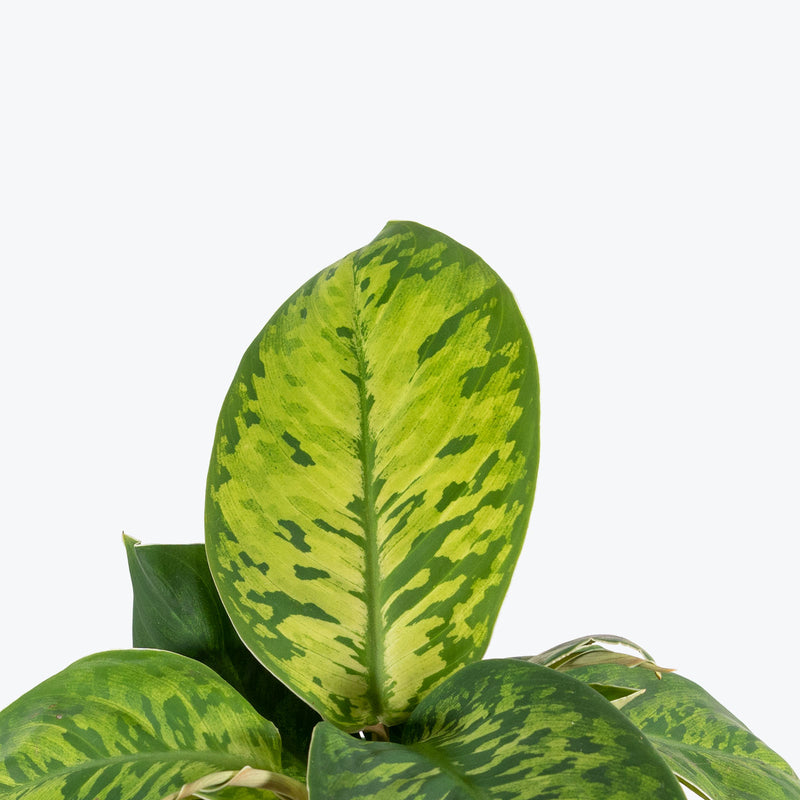
How to care for Homalomena Camouflage
They should not be in a position to see the sun directly, although early morning or late evening sun is fine. Filtered sunlight through a sheer curtain is best and most homes are comprised primarily of indirect sunlight. The best spot for them is where they do not see the sun during the majority of the day but still get bright, indirect light.
They will thrive in medium to bright light, but also can tolerate low light. A good medium-light place in your home would be in the middle of a room that has a regular size window. They can be placed almost anywhere in the room but remember, plants will grow based on how much light they receive.
They need to be watered when the top half of the soil is dry to the touch. That usually takes about 1 week in an average home environment. It will vary depending on the time of year, your environment and lighting conditions, but it's always safer to underwater or give the soil a check before you water again. Expect to water more often in brighter light and less often in lower light.
They will do well in average humidity environments but will appreciate a little bit of humidity if provided, give them a mist daily or get a humidifier.
It thrives in areas with seasonal humidity and thus is better suited to a warm room with medium to high humidity levels. Just like most other aroids, Homalomena are toxic to pets so they should be kept away from any inquisitive mouths.
This plant is moderately toxic and can cause some adverse reactions when ingested so it is best to not let your pets eat it, which we advise for all plants in general. The severity of the reaction will depend on how much of the plant is ingested but, if you know your pet typically does not eat your plants, this plant will be suitable for your home..
View PlantHomalomena Emerald Gem
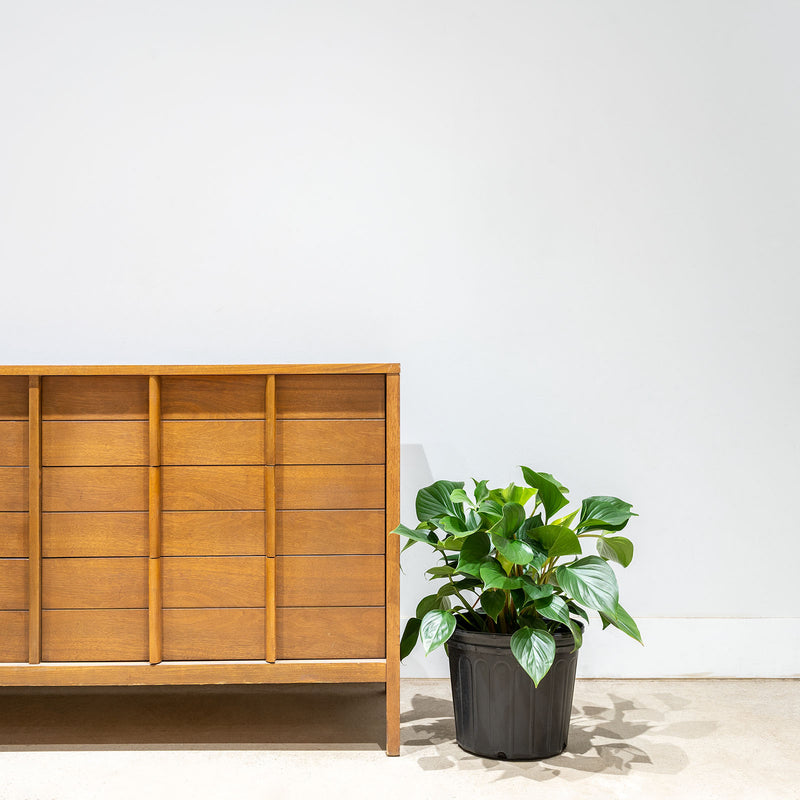
How to care for Homalomena Emerald Gem
They should not be in a position to see the sun directly, although early morning or late evening sun is fine. Filtered sunlight through a sheer curtain is best and most homes are comprised primarily of indirect sunlight. The best spot for them is where they do not see the sun during the majority of the day but still get bright, indirect light.
They will thrive in medium to bright light, but also can tolerate low light. A good medium-light place in your home would be in the middle of a room that has a regular size window. They can be placed almost anywhere in the room but remember, plants will grow based on how much light they receive.
They need to be watered when the top half of the soil is dry to the touch. That usually takes about 1 week in an average home environment. It will vary depending on the time of year, your environment and lighting conditions, but it's always safer to underwater or give the soil a check before you water again. Expect to water more often in brighter light and less often in lower light.
They can live in any average home humidity condition and are fairly hardy.
You may sometimes notice some leaves that turn yellow and then eventually die. You don’t have to worry about this as this is normal. You can do regular pruning and cut the dead leaves off, using neat and sharp shears.
This plant is moderately toxic and can cause some adverse reactions when ingested so it is best to not let your pets eat it, which we advise for all plants in general. The severity of the reaction will depend on how much of the plant is ingested but, if you know your pet typically does not eat your plants, this plant will be suitable for your home..
View PlantHomalomena Humilis Red Velvet
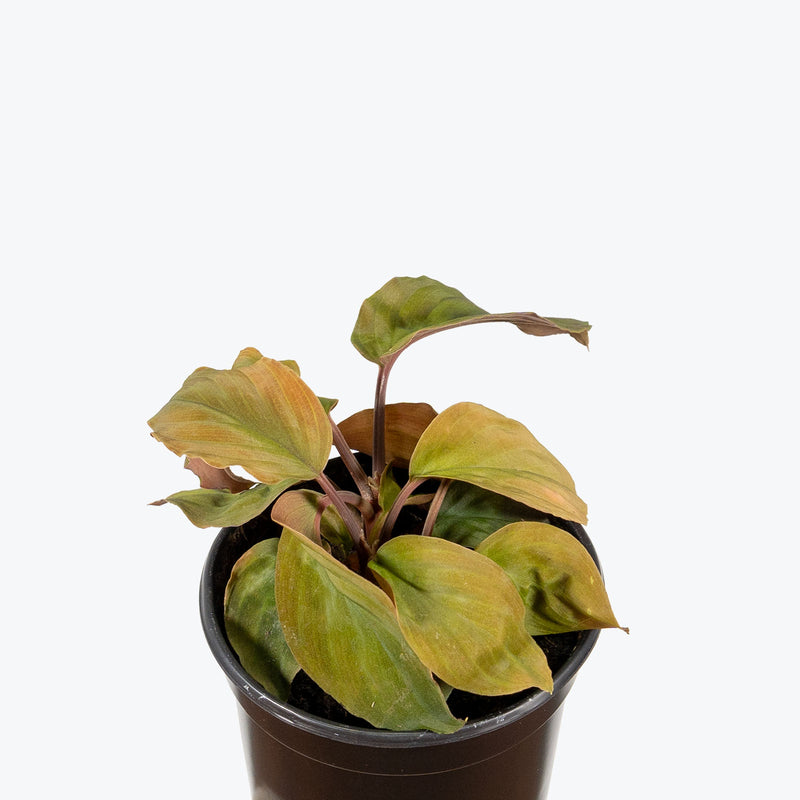
How to care for Homalomena Humilis Red Velvet
They should not be in a position to see the sun directly, although early morning or late evening sun is fine. Filtered sunlight through a sheer curtain is best and most homes are comprised primarily of indirect sunlight. The best spot for them is where they do not see the sun during the majority of the day but still get bright, indirect light.
They will thrive in medium to bright light, but also can tolerate low light. A good medium-light place in your home would be in the middle of a room that has a regular size window. They can be placed almost anywhere in the room but remember, plants will grow based on how much light they receive.
They need to be watered when the top half of the soil is dry to the touch. That usually takes about 1 week in an average home environment. It will vary depending on the time of year, your environment and lighting conditions, but it's always safer to underwater or give the soil a check before you water again. Expect to water more often in brighter light and less often in lower light.
They will do well in average humidity environments but will appreciate a little bit of humidity if provided, give them a mist daily or get a humidifier.
Homalomena humilis 'Red Velvet' can tolerate lower light conditions in your home, particularly this variety with its dark, velvety leaves and purple undersides. For optimal growth, however, consider providing it with medium to bright indirect light during the growing season.
This plant is moderately toxic and can cause some adverse reactions when ingested so it is best to not let your pets eat it, which we advise for all plants in general. The severity of the reaction will depend on how much of the plant is ingested but, if you know your pet typically does not eat your plants, this plant will be suitable for your home..
View PlantHomalomena Rubescens
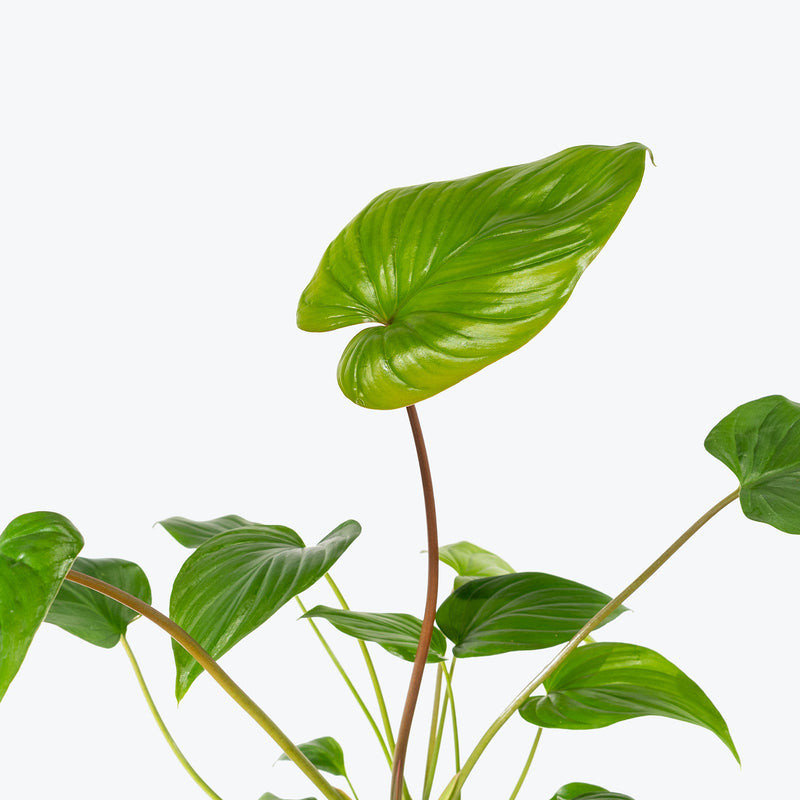
How to care for Homalomena Rubescens
Homalomena Rubescens should not be in a position to see the sun directly, although early morning or late evening sun is fine. Filtered sunlight through a sheer curtain is best and most homes are comprised primarily of indirect sunlight. The best spot for them is where they do not see the sun during the majority of the day but still get bright, indirect light.
Homalomena Rubescens will thrive in bright light, but also can tolerate medium light. A good medium-light place in your home would be in the middle of a room that has a regular size window. They can be placed anywhere between the middle of the room and the window. Remember that plants will grow based on how much light they receive.
Homalomena Rubescens needs to be watered when the top half of the soil is dry to the touch. That usually takes about 1 week in an average home environment. It will vary depending on the time of year, your environment and lighting conditions, but it's always safer to underwater or give the soil a check before you water again. Expect to water more often in brighter light and less often in lower light.
Homalomena Rubescens will do well in average humidity environments but will appreciate a little bit of humidity if provided, give them a mist daily or get a humidifier.
Fertilize Homalomena Rubescens every 4-6 weeks during the growing season with a balanced liquid fertilizer diluted to half strength. During the winter months, reduce fertilization as the plant's growth slows down. Clean the leaves periodically with a damp cloth to remove dust and support efficient photosynthesis.
Homalomena Rubescens is moderately toxic and can cause some adverse reactions when ingested so it is best to not let your pets eat it, which we advise for all plants in general. The severity of the reaction will depend on how much of the plant is ingested but, if you know your pet typically does not eat your plants, this plant will be suitable for your home..
View PlantHomalomena Selby
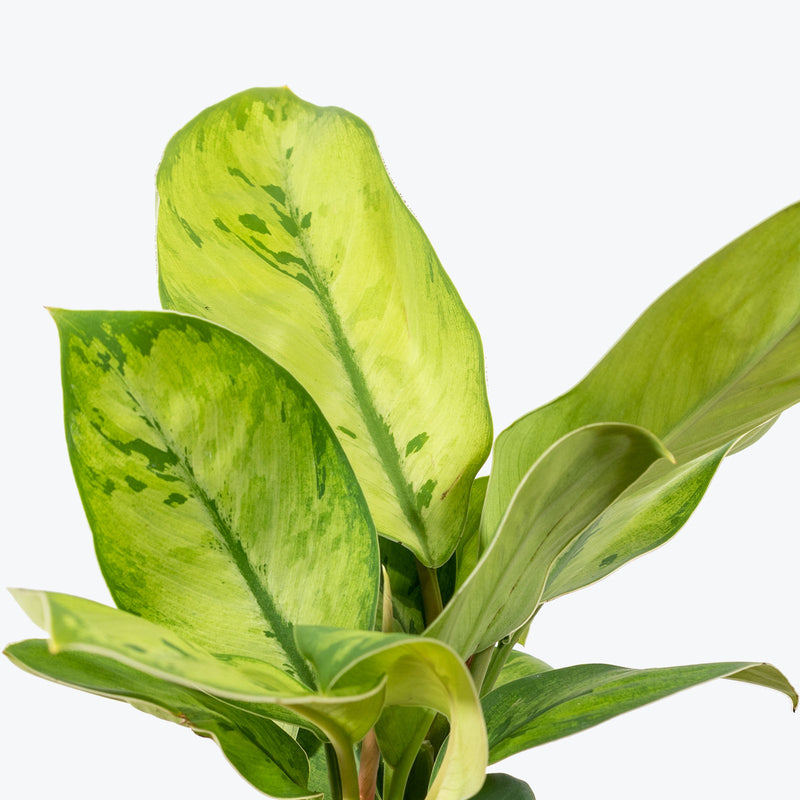
How to care for Homalomena Selby
They should not be in a position to see the sun directly, although early morning or late evening sun is fine. Filtered sunlight through a sheer curtain is best and most homes are comprised primarily of indirect sunlight. The best spot for them is where they do not see the sun during the majority of the day but still get bright, indirect light.
They will do well in medium light but will grow faster with brighter light. A good medium-light place in your home would be in the middle of a room that has a regular size window. Remember that plants will grow based on how much light they receive.
They need to be watered when the top half of the soil is dry to the touch. That usually takes about 1 week in an average home environment. It will vary depending on the time of year, your environment and lighting conditions, but it's always safer to underwater or give the soil a check before you water again. Expect to water more often in brighter light and less often in lower light.
They will do well in average humidity environments but will appreciate a little bit of humidity if provided, give them a mist daily or get a humidifier.
It is important to keep them watered during the active growing period, but be sure to let the water drain after and cut back on watering during the winter months, allowing the soil to mostly dry out.
This plant is moderately toxic and can cause some adverse reactions when ingested so it is best to not let your pets eat it, which we advise for all plants in general. The severity of the reaction will depend on how much of the plant is ingested but, if you know your pet typically does not eat your plants, this plant will be suitable for your home..
View PlantHoya Acuta Variegata
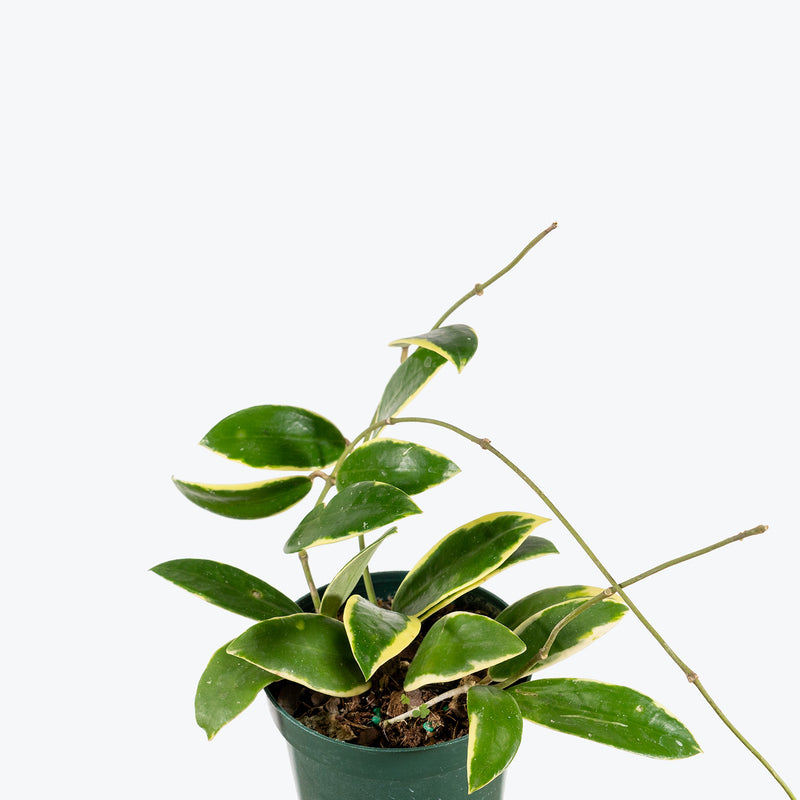
How to care for Hoya Acuta Variegata
Hoya Acuta Variegata should not be in a position to see the sun directly, although early morning or late evening sun is fine. Filtered sunlight through a sheer curtain is best and most homes are comprised primarily of indirect sunlight. The best spot for them is where they do not see the sun during the majority of the day but still get bright, indirect light.
Hoya Acuta Variegata will thrive in bright light, but also can tolerate medium light. A good medium-light place in your home would be in the middle of a room that has a regular size window. They can be placed anywhere between the middle of the room and the window. Remember that plants will grow based on how much light they receive.
Hoya Acuta Variegata likes the soil to be relatively dry before the next watering. That usually takes about 2 weeks in an average home environment. It will vary depending on the time of year, your environment and lighting conditions, but for them, it's always safer to underwater or water when you see signs of lack of water (i.e. droopy, floppy, or soft leaves). Expect to water more often in brighter light and less often in lower light.
Hoya Acuta Variegata can live in any average home humidity condition and are fairly hardy.
Fertilize your Hoya Acuta Variegata every few months during the growing season with a diluted, balanced liquid fertilizer to encourage growth and flowering. Regular pruning can help manage its vining growth and promote more bushy development. Hoyas generally like to be slightly root-bound, so repotting every few years in spring is sufficient.
You can feel comfortable having Hoya Acuta Variegata around your home in the potential case where your pet feels like nibbling on it. However, we typically recommend keeping your pets from eating any of your houseplants..
Learn MoreView PlantHoya Australis
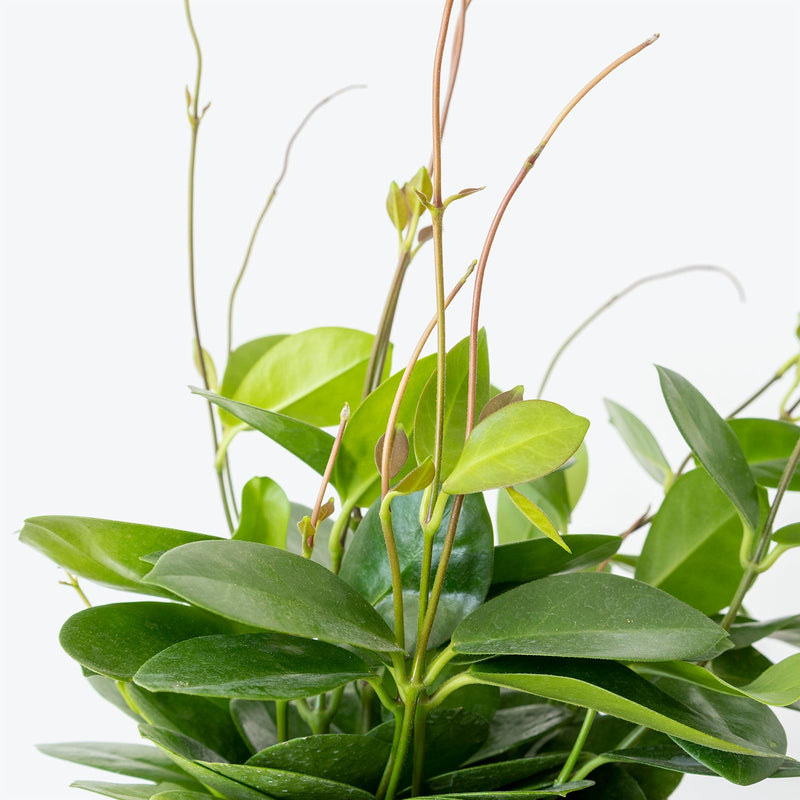
How to care for Hoya Australis
They should not be in a position to see the sun directly, although early morning or late evening sun is fine. Filtered sunlight through a sheer curtain is best and most homes are comprised primarily of indirect sunlight. The best spot for them is where they do not see the sun during the majority of the day but still get bright, indirect light.
They will do well in medium light but will grow faster with brighter light. A good medium-light place in your home would be in the middle of a room that has a regular size window. Remember that plants will grow based on how much light they receive.
They like the soil to be relatively dry before the next watering. That usually takes about 2 weeks in an average home environment. It will vary depending on the time of year, your environment and lighting conditions, but for them, it's always safer to underwater or water when you see signs of lack of water (i.e. droopy, floppy, or soft leaves). Expect to water more often in brighter light and less often in lower light.
They can live in any average home humidity condition and are fairly hardy.
If it is getting too much light you’ll find that the leaves start turning yellow, but still feel firm and healthy. In that case, just move it a little further away from the sun.
You can feel comfortable having this plant around your home in the potential case where your pet feels like nibbling on it. However, we typically recommend keeping your pets from eating any of your houseplants..
Learn MoreView PlantHoya Australis Lisa
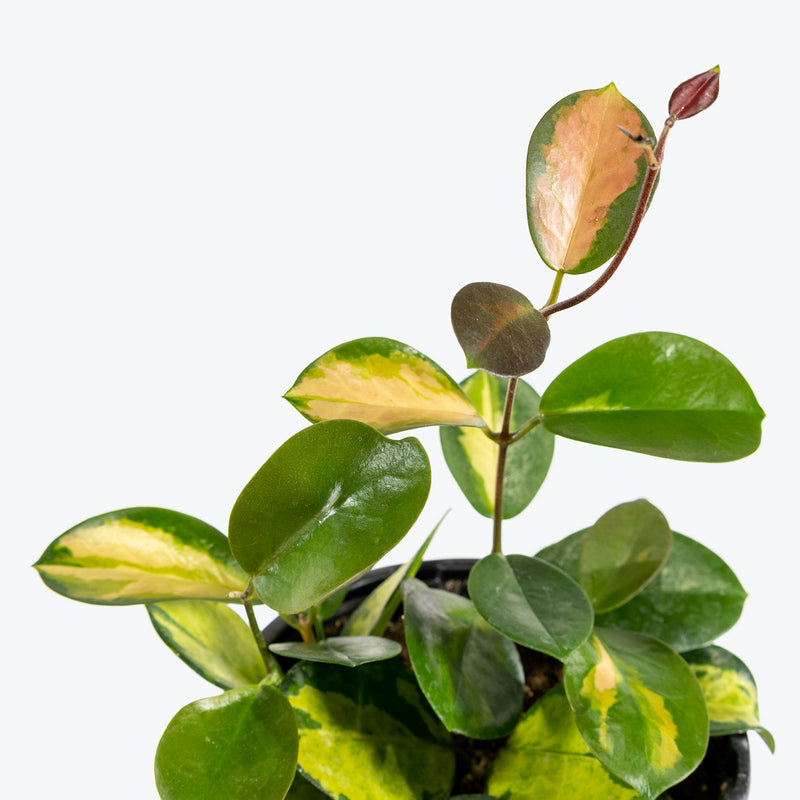
How to care for Hoya Australis Lisa
They enjoy some direct sun, but they'll also do well in bright, indirect light. It is best to place this plant somewhere where it will receive some nice morning sun, or a couple hours of afternoon sun, and then indirect light the rest of the day.
They will do best in bright light. A nice bright place inside your home would be on the window sill or a stool that is right next to a window, either with or without blinds, depending on if the plant can handle sun. Remember that plants will grow based on how much light they receive.
They like the soil to be relatively dry before the next watering. That usually takes about 2 weeks in an average home environment. It will vary depending on the time of year, your environment and lighting conditions, but for them, it's always safer to underwater or water when you see signs of lack of water (i.e. droopy, floppy, or soft leaves). Expect to water more often in brighter light and less often in lower light.
They can live in any average home humidity condition and are fairly hardy.
When Hoya's are "stressed," which can happen when they are not given enough water or receive too much sun or bright light, they can have some stunning reactions. If you want your plant to bloom, keep the soil dry, if you want the foliage to turn different shades of pinks, reds, or purples, depending on the plant, keep them in very bright light!
You can feel comfortable having this plant around your home in the potential case where your pet feels like nibbling on it. However, we typically recommend keeping your pets from eating any of your houseplants..
Learn MoreView PlantHoya Callistophylla
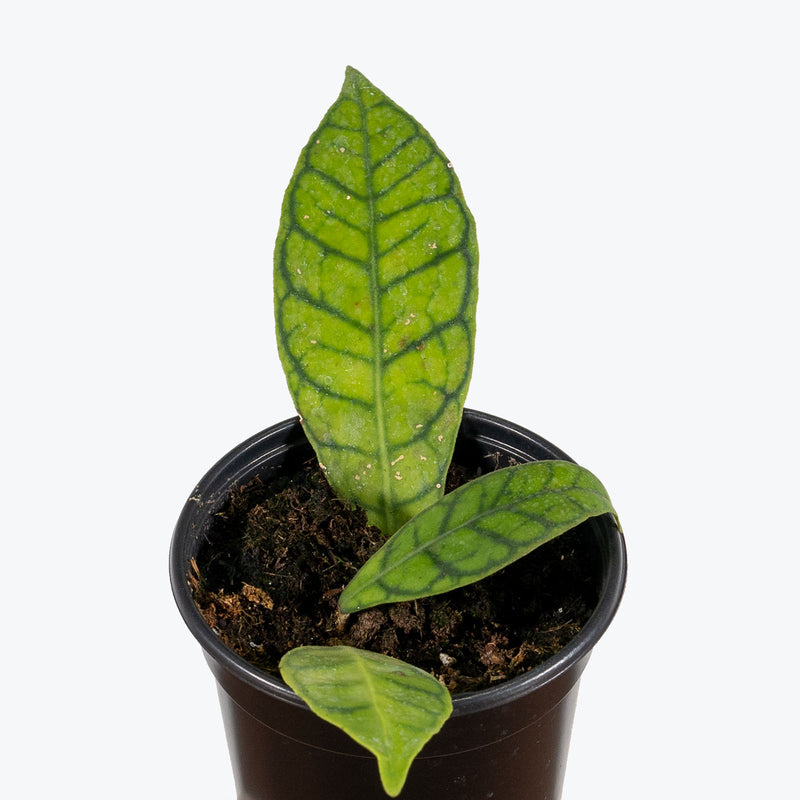
How to care for Hoya Callistophylla
They should not be in a position to see the sun directly, although early morning or late evening sun is fine. Filtered sunlight through a sheer curtain is best and most homes are comprised primarily of indirect sunlight. The best spot for them is where they do not see the sun during the majority of the day but still get bright, indirect light.
They will thrive in bright light, but also can tolerate medium light. A good medium-light place in your home would be in the middle of a room that has a regular size window. They can be placed anywhere between the middle of the room and the window. Remember that plants will grow based on how much light they receive.
They like the soil to be relatively dry before the next watering. That usually takes about 2 weeks in an average home environment. It will vary depending on the time of year, your environment and lighting conditions, but for them, it's always safer to underwater or water when you see signs of lack of water (i.e. droopy, floppy, or soft leaves). Expect to water more often in brighter light and less often in lower light.
They will do well in average humidity environments but will appreciate a little bit of humidity if provided, give them a mist daily or get a humidifier.
Hoya Callistophylla appreciates a well-draining, chunky soil mix like our Aroid Mix. Fertilizing during the growing season with organic fertilizer can support its slow growth, and repotting every few years or when roots emerge from the drainage holes will refresh its environment.
You can feel comfortable having this plant around your home in the potential case where your pet feels like nibbling on it. However, we typically recommend keeping your pets from eating any of your houseplants..
Learn MoreView PlantHoya Carnosa Krimson Princess
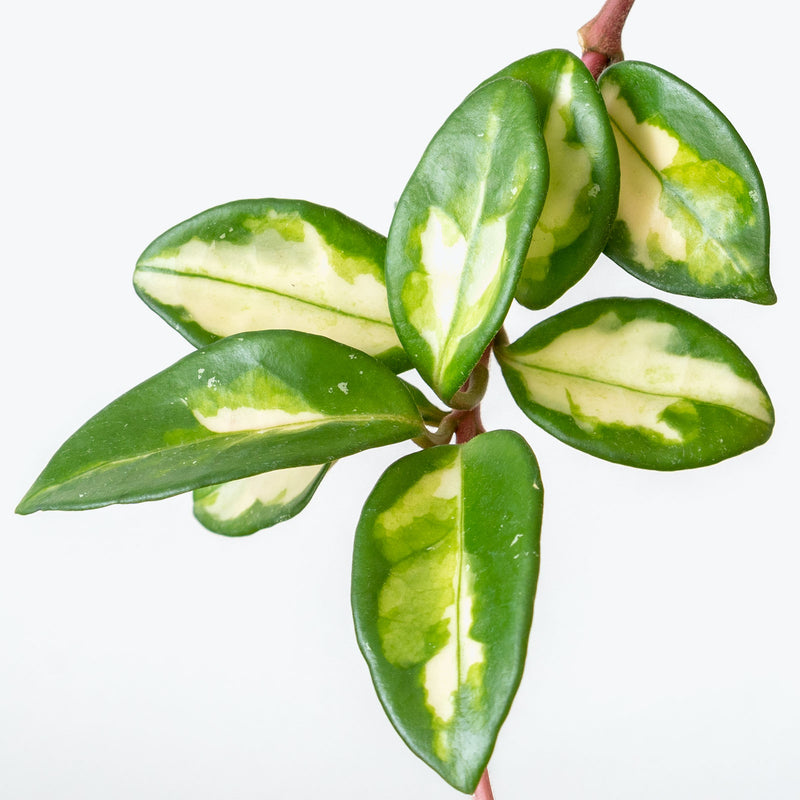
How to care for Hoya Carnosa Krimson Princess
They should not be in a position to see the sun directly, although early morning or late evening sun is fine. Filtered sunlight through a sheer curtain is best and most homes are comprised primarily of indirect sunlight. The best spot for them is where they do not see the sun during the majority of the day but still get bright, indirect light.
They will do well in medium light but will grow faster with brighter light. A good medium-light place in your home would be in the middle of a room that has a regular size window. Remember that plants will grow based on how much light they receive.
They like the soil to be relatively dry before the next watering. That usually takes about 2 weeks in an average home environment. It will vary depending on the time of year, your environment and lighting conditions, but for them, it's always safer to underwater or water when you see signs of lack of water (i.e. droopy, floppy, or soft leaves). Expect to water more often in brighter light and less often in lower light.
They can live in any average home humidity condition and are fairly hardy.
When Hoya's are "stressed," which can happen when they are not given enough water or receive too much sun or bright light, they can have some stunning reactions. If you want your plant to bloom, keep the soil dry, if you want the foliage to turn different shades of pinks, reds, or purples, depending on the plant, keep them in very bright light.
You can feel comfortable having this plant around your home in the potential case where your pet feels like nibbling on it. However, we typically recommend keeping your pets from eating any of your houseplants..
Learn MoreView PlantHoya Carnosa Krimson Queen
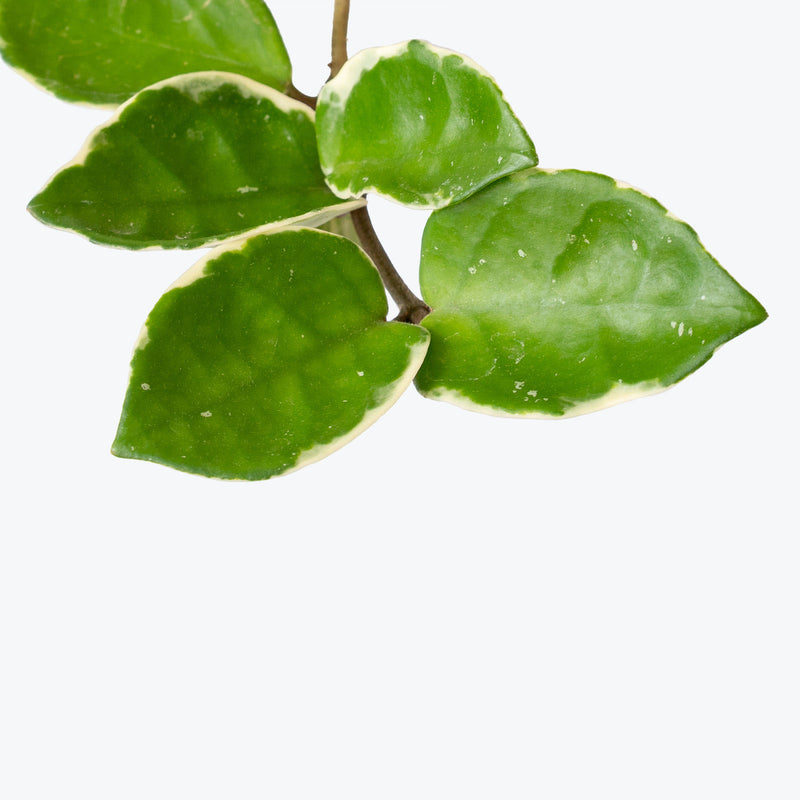
How to care for Hoya Carnosa Krimson Queen
They should not be in a position to see the sun directly, although early morning or late evening sun is fine. Filtered sunlight through a sheer curtain is best and most homes are comprised primarily of indirect sunlight. The best spot for them is where they do not see the sun during the majority of the day but still get bright, indirect light.
They will do well in medium light but will grow faster with brighter light. A good medium-light place in your home would be in the middle of a room that has a regular size window. Remember that plants will grow based on how much light they receive.
They like the soil to be relatively dry before the next watering. That usually takes about two weeks in an average home environment. It may vary depending on the time of year, your environment and lighting conditions, but for them, it's always safer to underwater or water when you see signs of lack of water (i.e. droopy, floppy, or soft leaves). Water more often in the warmer months!
They can live in any average home humidity condition and are fairly hardy.
When Hoya's are "stressed," which can happen when they are not given enough water or receive too much sun or bright light, they can have some stunning reactions. If you want your plant to bloom, keep the soil dry, if you want the foliage to turn different shades of pinks, reds, or purples, depending on the plant, keep them in very bright light.
You can feel comfortable having this plant around your home in the potential case where your pet feels like nibbling on it. However, we typically recommend keeping your pets from eating any of your houseplants..
Learn MoreView PlantHoya Carnosa Original
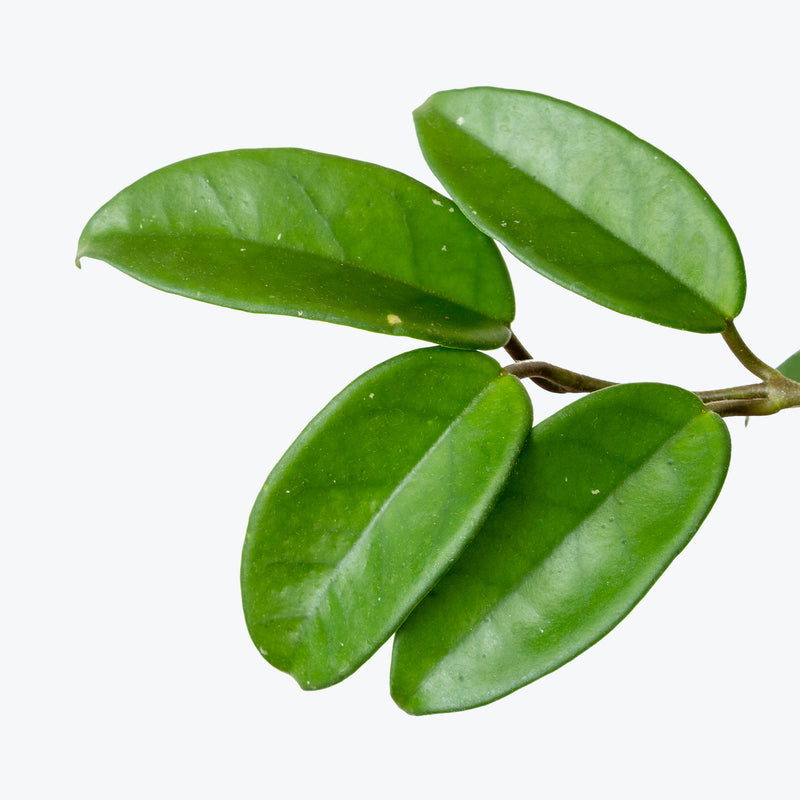
How to care for Hoya Carnosa Original
They should not be in a position to see the sun directly, although early morning or late evening sun is fine. Filtered sunlight through a sheer curtain is best and most homes are comprised primarily of indirect sunlight. The best spot for them is where they do not see the sun during the majority of the day but still get bright, indirect light.
They will thrive in medium to bright light, but also can tolerate low light. A good medium-light place in your home would be in the middle of a room that has a regular size window. They can be placed almost anywhere in the room but remember, plants will grow based on how much light they receive.
They like the soil to be relatively dry before the next watering. That usually takes about 2 weeks in an average home environment. It will vary depending on the time of year, your environment and lighting conditions, but for them, it's always safer to underwater or water when you see signs of lack of water (i.e. droopy, floppy, or soft leaves). Expect to water more often in brighter light and less often in lower light.
They can live in any average home humidity condition and are fairly hardy.
If it is getting too much light you’ll find that the leaves start turning yellow, but still feel firm and healthy. In that case, just move it a little further away from the sun.
You can feel comfortable having this plant around your home in the potential case where your pet feels like nibbling on it. However, we typically recommend keeping your pets from eating any of your houseplants..
Learn MoreView PlantHoya Chelsea
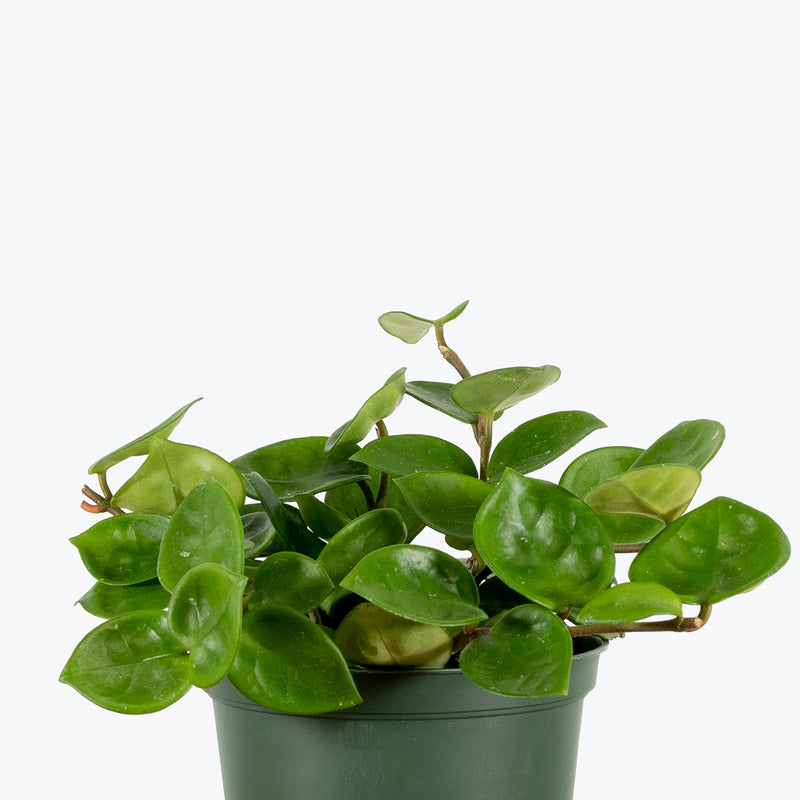
How to care for Hoya Chelsea
They should not be in a position to see the sun directly, although early morning or late evening sun is fine. Filtered sunlight through a sheer curtain is best and most homes are comprised primarily of indirect sunlight. The best spot for them is where they do not see the sun during the majority of the day but still get bright, indirect light.
They will thrive in bright light, but also can tolerate medium light. A good medium-light place in your home would be in the middle of a room that has a regular size window. They can be placed anywhere between the middle of the room and the window. Remember that plants will grow based on how much light they receive.
They like the soil to be relatively dry before the next watering. That usually takes about 2 weeks in an average home environment. It will vary depending on the time of year, your environment and lighting conditions, but for them, it's always safer to underwater or water when you see signs of lack of water (i.e. droopy, floppy, or soft leaves). Expect to water more often in brighter light and less often in lower light.
They can live in any average home humidity condition and are fairly hardy.
When Hoya's are "stressed," which can happen when they are not given enough water or receive too much sun or bright light, they can have some stunning reactions. If you want your plant to bloom, keep the soil dry, if you want the foliage to turn different shades of pinks, reds, or purples, depending on the plant, keep them in very bright light.
You can feel comfortable having this plant around your home in the potential case where your pet feels like nibbling on it. However, we typically recommend keeping your pets from eating any of your houseplants..
Learn MoreView PlantHoya Chelsea Variegata
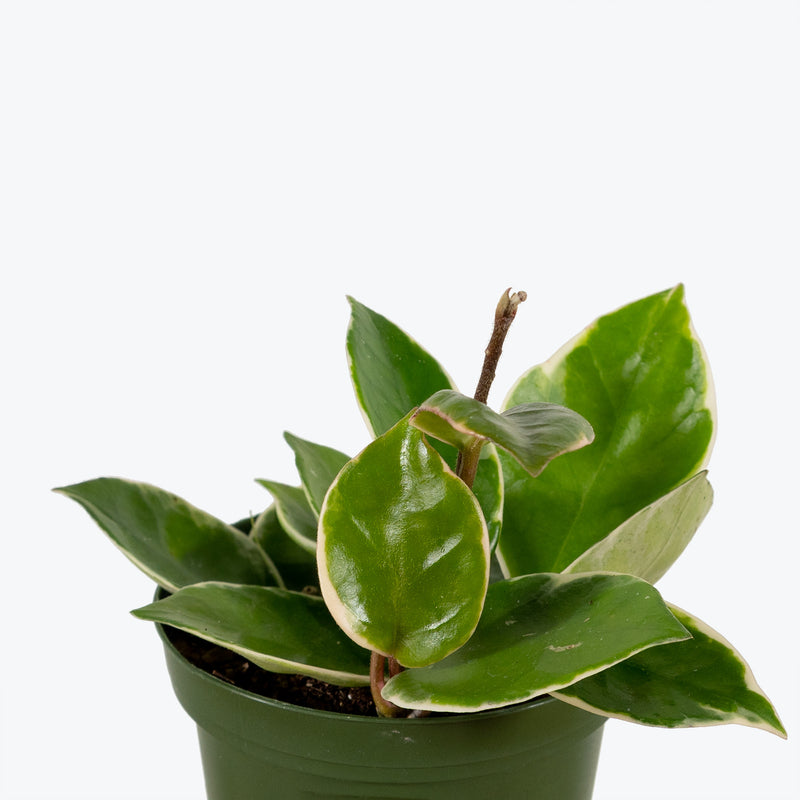
How to care for Hoya Chelsea Variegata
They should not be in a position to see the sun directly, although early morning or late evening sun is fine. Filtered sunlight through a sheer curtain is best and most homes are comprised primarily of indirect sunlight. The best spot for them is where they do not see the sun during the majority of the day but still get bright, indirect light.
They will thrive in bright light, but also can tolerate medium light. A good medium-light place in your home would be in the middle of a room that has a regular size window. They can be placed anywhere between the middle of the room and the window. Remember that plants will grow based on how much light they receive.
They like the soil to be relatively dry before the next watering. That usually takes about 2 weeks in an average home environment. It will vary depending on the time of year, your environment and lighting conditions, but for them, it's always safer to underwater or water when you see signs of lack of water (i.e. droopy, floppy, or soft leaves). Expect to water more often in brighter light and less often in lower light.
They can live in any average home humidity condition and are fairly hardy.
When Hoya's are "stressed," which can happen when they are not given enough water or receive too much sun or bright light, they can have some stunning reactions. If you want your plant to bloom, keep the soil dry, if you want the foliage to turn different shades of pinks, reds, or purples, depending on the plant, keep them in very bright light.
You can feel comfortable having this plant around your home in the potential case where your pet feels like nibbling on it. However, we typically recommend keeping your pets from eating any of your houseplants..
Learn MoreView PlantHoya Crassipetiolata
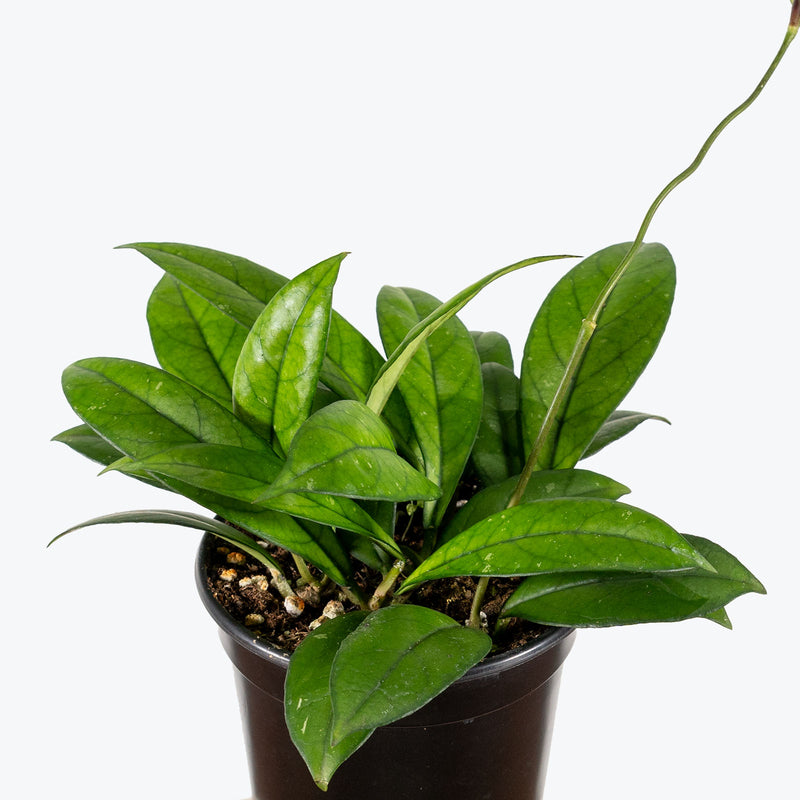
How to care for Hoya Crassipetiolata
Hoya Crassipetiolata enjoys some direct sun, but they'll also do well in bright, indirect light. It is best to place this plant somewhere where it will receive some nice morning sun, or a couple hours of afternoon sun, and then indirect light the rest of the day.
Hoya Crassipetiolata will thrive in bright light, but also can tolerate medium light. A good medium-light place in your home would be in the middle of a room that has a regular size window. They can be placed anywhere between the middle of the room and the window. Remember that plants will grow based on how much light they receive.
Hoya Crassipetiolata likes the soil to be relatively dry before the next watering. That usually takes about 2 weeks in an average home environment. It will vary depending on the time of year, your environment and lighting conditions, but for them, it's always safer to underwater or water when you see signs of lack of water (i.e. droopy, floppy, or soft leaves). Expect to water more often in brighter light and less often in lower light.
Hoya Crassipetiolata will do well in average humidity environments but will appreciate a little bit of humidity if provided, give them a mist daily or get a humidifier.
Hoya Crassipetiolata will benefit from regular pruning to encourage bushier growth and a more compact form. Additionally, provide a trellis or support for the plant to climb as it grows. Feed the plant with a balanced fertilizer during the growing season to promote healthy growth and blooming.
You can feel comfortable having Hoya Crassipetiolata around your home in the potential case where your pet feels like nibbling on it. However, we typically recommend keeping your pets from eating any of your houseplants..
Learn MoreView PlantHoya Curtisii
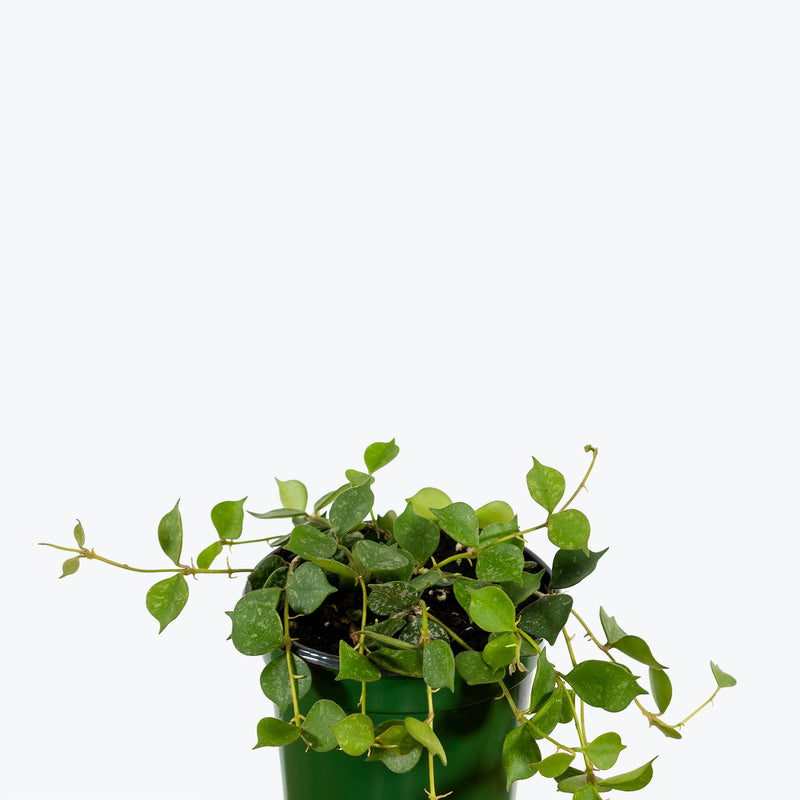
How to care for Hoya Curtisii
They enjoy some direct sun, but they'll also do well in bright, indirect light. It is best to place this plant somewhere where it will receive some nice morning sun, or a couple hours of afternoon sun, and then indirect light the rest of the day.
They will thrive in bright light, but also can tolerate medium light. A good medium-light place in your home would be in the middle of a room that has a regular size window. They can be placed anywhere between the middle of the room and the window. Remember that plants will grow based on how much light they receive.
They like the soil to be relatively dry before the next watering. That usually takes about 2 weeks in an average home environment. It will vary depending on the time of year, your environment and lighting conditions, but for them, it's always safer to underwater or water when you see signs of lack of water (i.e. droopy, floppy, or soft leaves). Expect to water more often in brighter light and less often in lower light.
They will do well in average humidity environments but will appreciate a little bit of humidity if provided, give them a mist daily or get a humidifier.
When Hoya's are "stressed," which can happen when they are not given enough water or receive too much sun or bright light, they can have some stunning reactions. If you want your plant to bloom, keep the soil dry and keep it in very bright light.
You can feel comfortable having this plant around your home in the potential case where your pet feels like nibbling on it. However, we typically recommend keeping your pets from eating any of your houseplants..
Learn MoreView PlantHoya DS-70 Variegated
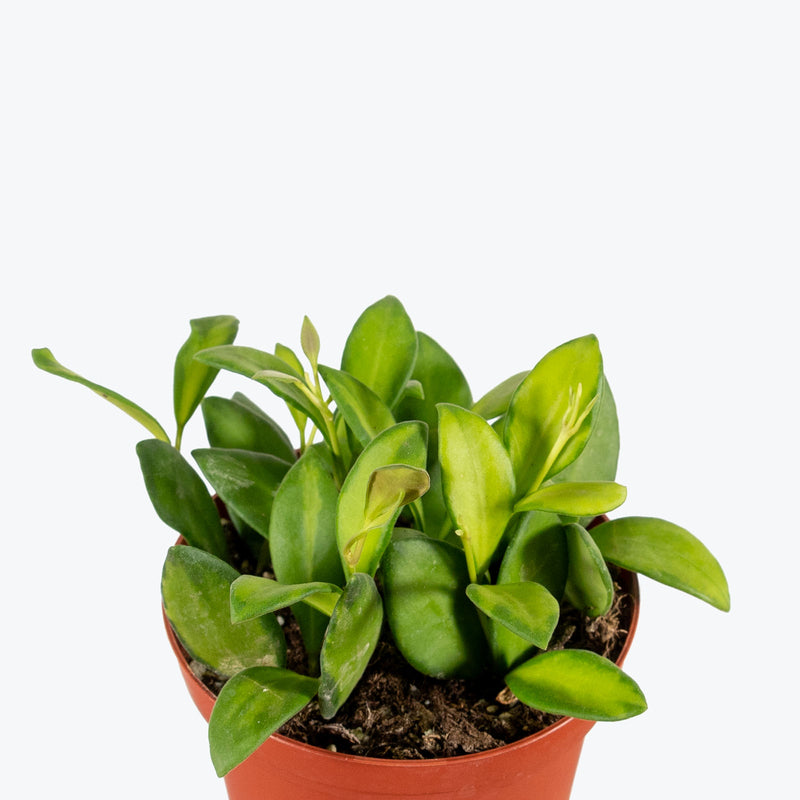
How to care for Hoya DS-70 Variegated
Hoya DS-70 Variegated should not be in a position to see the sun directly, although early morning or late evening sun is fine. Filtered sunlight through a sheer curtain is best and most homes are comprised primarily of indirect sunlight. The best spot for them is where they do not see the sun during the majority of the day but still get bright, indirect light.
Hoya DS-70 Variegated will thrive in bright light, but also can tolerate medium light. A good medium-light place in your home would be in the middle of a room that has a regular size window. They can be placed anywhere between the middle of the room and the window. Remember that plants will grow based on how much light they receive.
Hoya DS-70 Variegated likes the soil to be relatively dry before the next watering. That usually takes about 2 weeks in an average home environment. It will vary depending on the time of year, your environment and lighting conditions, but for them, it's always safer to underwater or water when you see signs of lack of water (i.e. droopy, floppy, or soft leaves). Expect to water more often in brighter light and less often in lower light.
Hoya DS-70 Variegated can live in any average home humidity condition and are fairly hardy.
Feed Hoya DS-70 Variegated regularly during the growing season with a low-nitrogen fertilizer that contains sufficient amounts of phosphorous and potassium to support flowering. Do not remove the peduncles (flower stalks) after blooming, as Hoyas can rebloom from the same stalks multiple times. Support the trailing vines with a trellis or let them hang freely from a basket for a natural, cascading effect.
You can feel comfortable having Hoya DS-70 Variegated around your home in the potential case where your pet feels like nibbling on it. However, we typically recommend keeping your pets from eating any of your houseplants..
Learn MoreView PlantHoya Endauensis
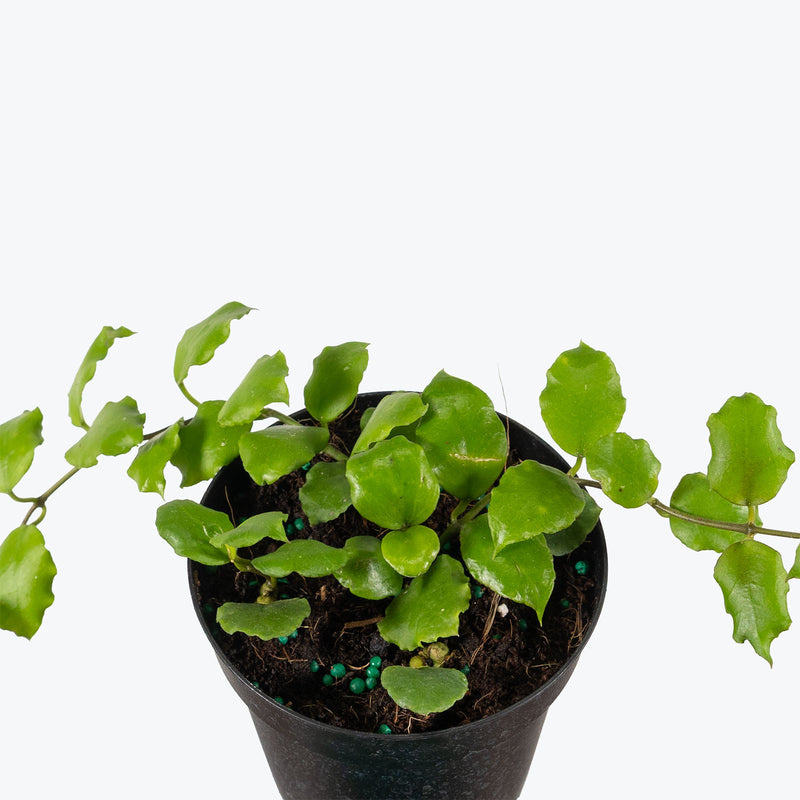
How to care for Hoya Endauensis
Hoya Endauensis should not be in a position to see the sun directly, although early morning or late evening sun is fine. Filtered sunlight through a sheer curtain is best and most homes are comprised primarily of indirect sunlight. The best spot for them is where they do not see the sun during the majority of the day but still get bright, indirect light.
Hoya Endauensis will thrive in bright light, but also can tolerate medium light. A good medium-light place in your home would be in the middle of a room that has a regular size window. They can be placed anywhere between the middle of the room and the window. Remember that plants will grow based on how much light they receive.
Hoya Endauensis likes the soil to be relatively dry before the next watering. That usually takes about 2 weeks in an average home environment. It will vary depending on the time of year, your environment and lighting conditions, but for them, it's always safer to underwater or water when you see signs of lack of water (i.e. droopy, floppy, or soft leaves). Expect to water more often in brighter light and less often in lower light.
Hoya Endauensis likes a high humidity environment, give them a mist daily or as often as possible. Alternatively, you can put them around a humidifier. Although they won't die if they don't receive enough humidity, their leaves may have some dry, crunchy, or yellow edges.
Hoya Endauensis can be fussy, preferring stable warmth, consistent moisture, and high humidity. Use a chunky, airy mix (orchid bark, perlite, sphagnum) to mimic its natural epiphytic conditions. Fertilize lightly and regularly during the growing season to support foliage and flowering. Patience and consistent care will be rewarded with clusters of glowing orange blooms.
You can feel comfortable having Hoya Endauensis around your home in the potential case where your pet feels like nibbling on it. However, we typically recommend keeping your pets from eating any of your houseplants..
Learn MoreView PlantHoya Finlaysonii

How to care for Hoya Finlaysonii
Hoya Finlaysonii should not be in a position to see the sun directly, although early morning or late evening sun is fine. Filtered sunlight through a sheer curtain is best and most homes are comprised primarily of indirect sunlight. The best spot for them is where they do not see the sun during the majority of the day but still get bright, indirect light.
Hoya Finlaysonii will thrive in bright light, but also can tolerate medium light. A good medium-light place in your home would be in the middle of a room that has a regular size window. They can be placed anywhere between the middle of the room and the window. Remember that plants will grow based on how much light they receive.
Hoya Finlaysonii likes the soil to be relatively dry before the next watering. That usually takes about 2 weeks in an average home environment. It will vary depending on the time of year, your environment and lighting conditions, but for them, it's always safer to underwater or water when you see signs of lack of water (i.e. droopy, floppy, or soft leaves). Expect to water more often in brighter light and less often in lower light.
Hoya Finlaysonii will do well in average humidity environments but will appreciate a little bit of humidity if provided, give them a mist daily or get a humidifier.
Grow in a chunky, airy mix of orchid bark, perlite, and coco coir to support its semi-epiphytic nature. Fertilize every 4–6 weeks during spring and summer with a diluted, balanced fertilizer. Provide a trellis or allow vines to trail naturally. Stable warmth encourages flowering, and a slightly root-bound plant is more likely to bloom. The blooms are lightly cinnamon scented, a sweet reward for consistent care.
You can feel comfortable having Hoya Finlaysonii around your home in the potential case where your pet feels like nibbling on it. However, we typically recommend keeping your pets from eating any of your houseplants..
Learn MoreView PlantHoya Hellwigiana
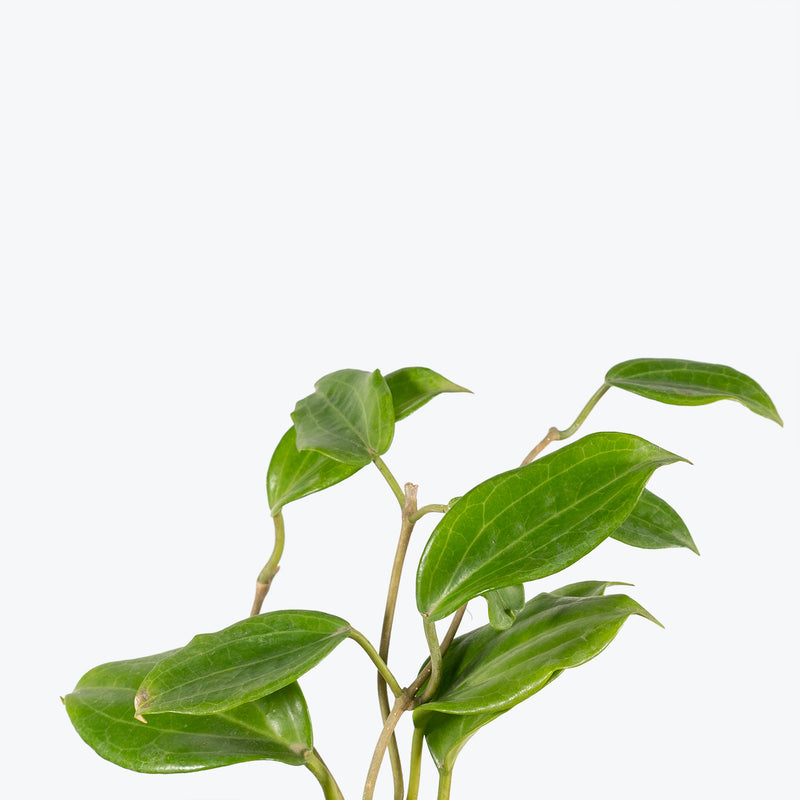
How to care for Hoya Hellwigiana
Hoya Hellwigiana should not be in a position to see the sun directly, although early morning or late evening sun is fine. Filtered sunlight through a sheer curtain is best and most homes are comprised primarily of indirect sunlight. The best spot for them is where they do not see the sun during the majority of the day but still get bright, indirect light.
Hoya Hellwigiana will thrive in bright light, but also can tolerate medium light. A good medium-light place in your home would be in the middle of a room that has a regular size window. They can be placed anywhere between the middle of the room and the window. Remember that plants will grow based on how much light they receive.
Hoya Hellwigiana likes the soil to be relatively dry before the next watering. That usually takes about 2 weeks in an average home environment. It will vary depending on the time of year, your environment and lighting conditions, but for them, it's always safer to underwater or water when you see signs of lack of water (i.e. droopy, floppy, or soft leaves). Expect to water more often in brighter light and less often in lower light.
Hoya Hellwigiana can live in any average home humidity condition and are fairly hardy.
Fertilize your Hoya Hellwigiana every 2-3 months during the spring and summer with a balanced, water-soluble fertilizer diluted to half strength. This will help support its growth and flowering potential. Regular pruning is not necessary but can be done to control its size or remove any unhealthy or dead foliage.
You can feel comfortable having Hoya Hellwigiana around your home in the potential case where your pet feels like nibbling on it. However, we typically recommend keeping your pets from eating any of your houseplants..
Learn MoreView PlantHoya Hindu Rope
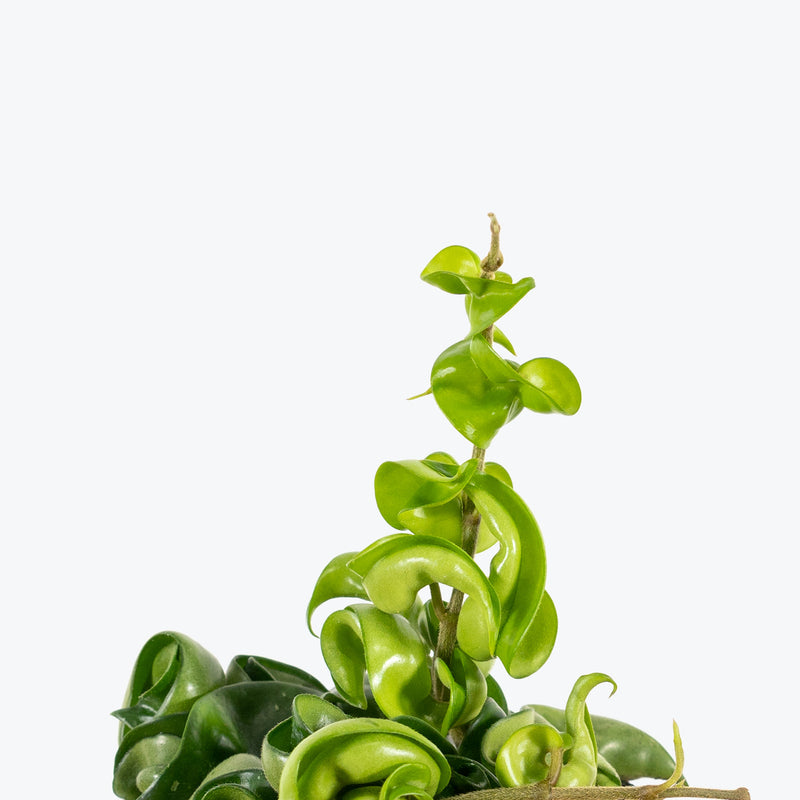
How to care for Hoya Hindu Rope
Hoya Hindu Rope should not be in a position to see the sun directly, although early morning or late evening sun is fine. Filtered sunlight through a sheer curtain is best and most homes are comprised primarily of indirect sunlight. The best spot for them is where they do not see the sun during the majority of the day but still get bright, indirect light.
Hoya Hindu Rope will thrive in medium to bright light, but also can tolerate low light. A good medium-light place in your home would be in the middle of a room that has a regular size window. They can be placed almost anywhere in the room but remember, plants will grow based on how much light they receive.
Hoya Hindu Rope likes the soil to be relatively dry before the next watering. That usually takes about 2 weeks in an average home environment. It will vary depending on the time of year, your environment and lighting conditions, but for them, it's always safer to underwater or water when you see signs of lack of water (i.e. droopy, floppy, or soft leaves). Expect to water more often in brighter light and less often in lower light.
Hoya Hindu Rope can live in any average home humidity condition and are fairly hardy.
If Hoya Hindu Rope is getting too much light you’ll find that the leaves start turning yellow, but still feel firm and healthy. In that case, just move it a little further away from the sun.
You can feel comfortable having Hoya Hindu Rope around your home in the potential case where your pet feels like nibbling on it. However, we typically recommend keeping your pets from eating any of your houseplants..
Learn MoreView PlantHoya Hindu Rope Variegata
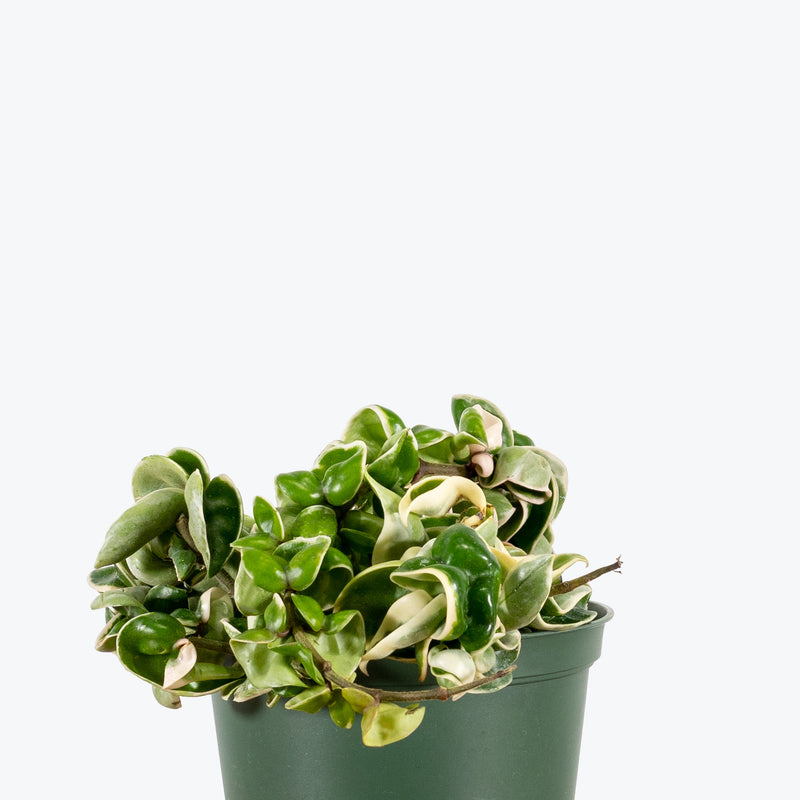
How to care for Hoya Hindu Rope Variegata
They should not be in a position to see the sun directly, although early morning or late evening sun is fine. Filtered sunlight through a sheer curtain is best and most homes are comprised primarily of indirect sunlight. The best spot for them is where they do not see the sun during the majority of the day but still get bright, indirect light.
They will thrive in bright light, but also can tolerate medium light. A good medium-light place in your home would be in the middle of a room that has a regular size window. They can be placed anywhere between the middle of the room and the window. Remember that plants will grow based on how much light they receive.
They like the soil to be relatively dry before the next watering. That usually takes about 2 weeks in an average home environment. It will vary depending on the time of year, your environment and lighting conditions, but for them, it's always safer to underwater or water when you see signs of lack of water (i.e. droopy, floppy, or soft leaves). Expect to water more often in brighter light and less often in lower light.
They can live in any average home humidity condition and are fairly hardy.
When Hoya's are "stressed," which can happen when they are not given enough water or receive too much sun or bright light, they can have some stunning reactions. If you want your plant to bloom, keep the soil dry, if you want the foliage to turn different shades of pinks, reds, or purples, depending on the plant, keep them in very bright light!
You can feel comfortable having this plant around your home in the potential case where your pet feels like nibbling on it. However, we typically recommend keeping your pets from eating any of your houseplants..
Learn MoreView PlantHoya Incrassata Variegata
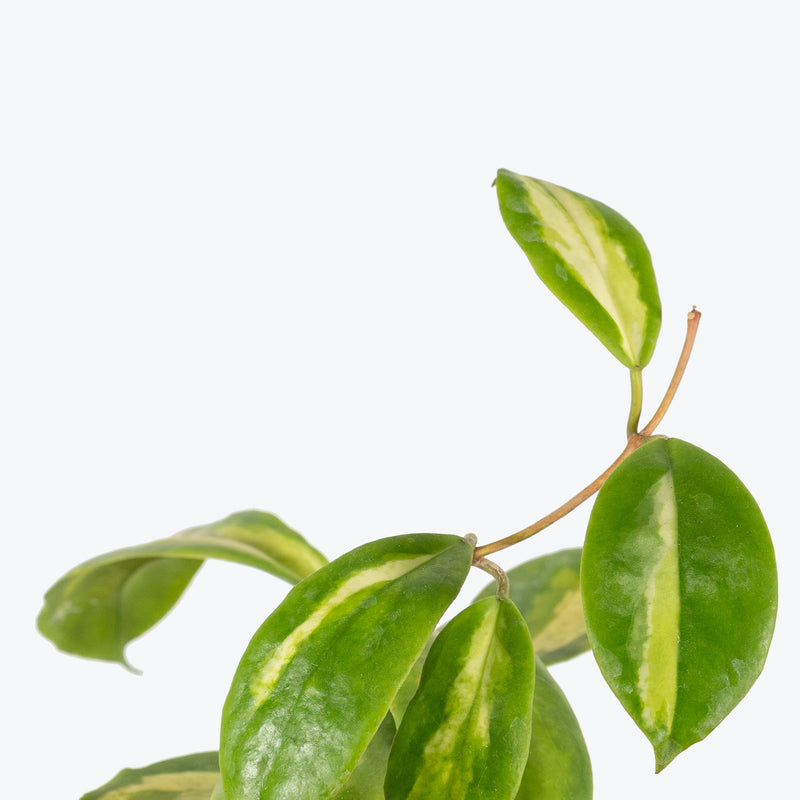
How to care for Hoya Incrassata Variegata
Hoya Incrassata Variegata should not be in a position to see the sun directly, although early morning or late evening sun is fine. Filtered sunlight through a sheer curtain is best and most homes are comprised primarily of indirect sunlight. The best spot for them is where they do not see the sun during the majority of the day but still get bright, indirect light.
Hoya Incrassata Variegata will thrive in bright light, but also can tolerate medium light. A good medium-light place in your home would be in the middle of a room that has a regular size window. They can be placed anywhere between the middle of the room and the window. Remember that plants will grow based on how much light they receive.
Hoya Incrassata Variegata likes the soil to be relatively dry before the next watering. That usually takes about 2 weeks in an average home environment. It will vary depending on the time of year, your environment and lighting conditions, but for them, it's always safer to underwater or water when you see signs of lack of water (i.e. droopy, floppy, or soft leaves). Expect to water more often in brighter light and less often in lower light.
Hoya Incrassata Variegata can live in any average home humidity condition and are fairly hardy.
Feed Hoya Incrassata Variegata with a diluted, balanced fertilizer every four to six weeks during the growing season (spring and summer). Reduce feeding in the winter when the plant's growth slows down. Regular pruning is not necessary but can be done to control the size or remove any unhealthy growth. Hoyas can be susceptible to mealybugs and aphids, so keep an eye out for pests and treat them promptly.
You can feel comfortable having Hoya Incrassata Variegata around your home in the potential case where your pet feels like nibbling on it. However, we typically recommend keeping your pets from eating any of your houseplants..
Learn MoreView PlantHoya Kentiana Variegata
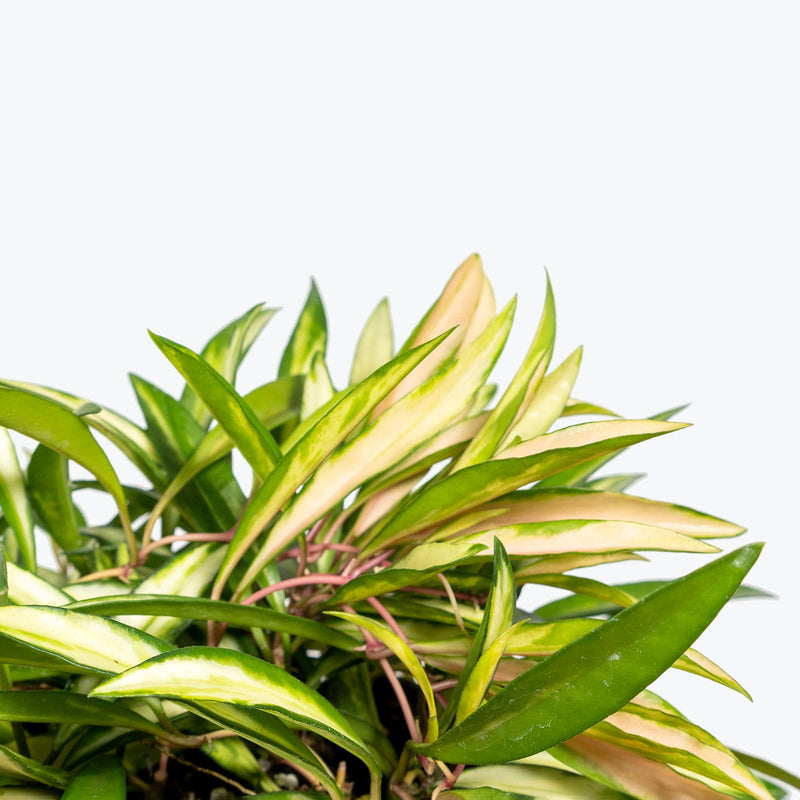
How to care for Hoya Kentiana Variegata
They enjoy some direct sun, but they'll also do well in bright, indirect light. It is best to place this plant somewhere where it will receive some nice morning sun, or a couple hours of afternoon sun, and then indirect light the rest of the day.
They will do best in bright light. A nice bright place inside your home would be on the window sill or a stool that is right next to a window, either with or without blinds, depending on if the plant can handle sun. Remember that plants will grow based on how much light they receive.
They like the soil to be relatively dry before the next watering. That usually takes about 2 weeks in an average home environment. It will vary depending on the time of year, your environment and lighting conditions, but for them, it's always safer to underwater or water when you see signs of lack of water (i.e. droopy, floppy, or soft leaves). Expect to water more often in brighter light and less often in lower light.
They will do well in average humidity environments but will appreciate a little bit of humidity if provided, give them a mist daily or get a humidifier.
When Hoya's are "stressed," which can happen when they are not given enough water or receive too much sun or bright light, they can have some stunning reactions, such as red or pink-tinged foliage, or beautiful flowers. If you want your plant to bloom, keep the soil on the dry side and keep it in bright light. Watering needs will change throughout the year - during the growing season, water when the soil is mostly dry, then during the winter season, let the soil dry out a little more between waterings.
You can feel comfortable having this plant around your home in the potential case where your pet feels like nibbling on it. However, we typically recommend keeping your pets from eating any of your houseplants..
Learn MoreView PlantHoya Kerrii
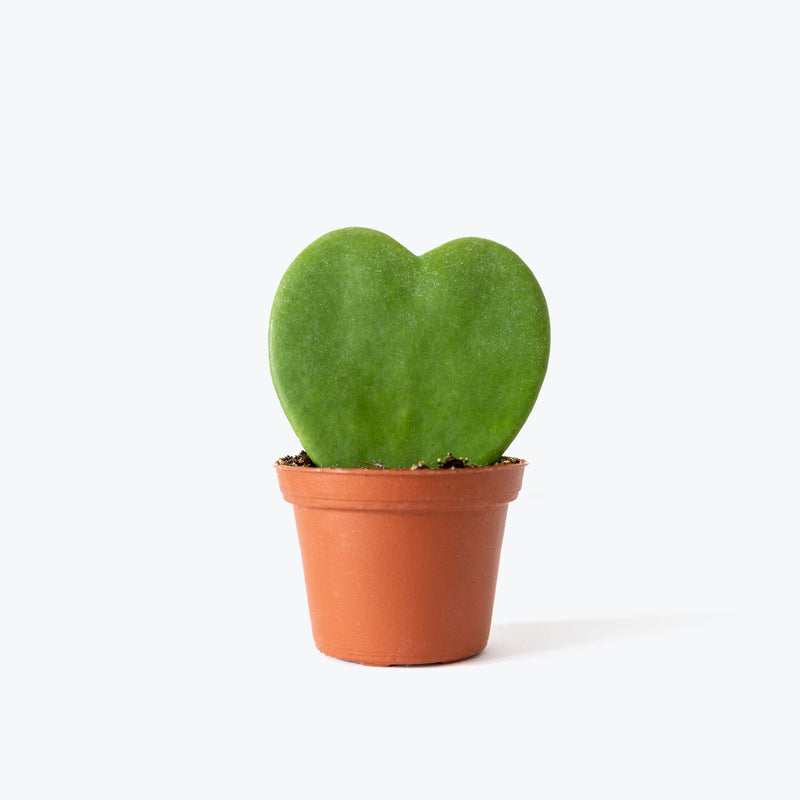
How to care for Hoya Kerrii
Hoya Kerrii enjoys some direct sun, but they'll also do well in bright, indirect light. It is best to place this plant somewhere where it will receive some nice morning sun, or a couple hours of afternoon sun, and then indirect light for the rest of the day.
Hoya Kerrii will thrive in bright light, but also can tolerate medium light. A good medium-light place in your home would be in the middle of a room that has a regular size window. They can be placed anywhere between the middle of the room and the window. Remember that plants will grow based on how much light they receive.
Hoya Kerrii likes the soil to be relatively dry before the next watering. That usually takes about 2 weeks in an average home environment. It will vary depending on the time of year, your environment and lighting conditions, but for them, it's always safer to underwater or water when you see signs of lack of water (i.e. droopy, floppy, or soft leaves). Expect to water more often in brighter light and less often in lower light.
Hoya Kerrii can live in any average home humidity condition and are fairly hardy.
Be patient—Hoya kerrii is notoriously slow-growing, especially when young. Single-leaf cuttings may remain in their heart form indefinitely, while multi-node cuttings or established plants can eventually vine. To encourage blooms, provide bright light, a tight-fitting pot, and a light bloom booster fertilizer in summer.
You can feel comfortable having Hoya Kerrii around your home in the potential case where your pet feels like nibbling on it. However, we typically recommend keeping your pets from eating any of your houseplants..
Learn MoreView PlantHoya Kerrii Reverse Variegata
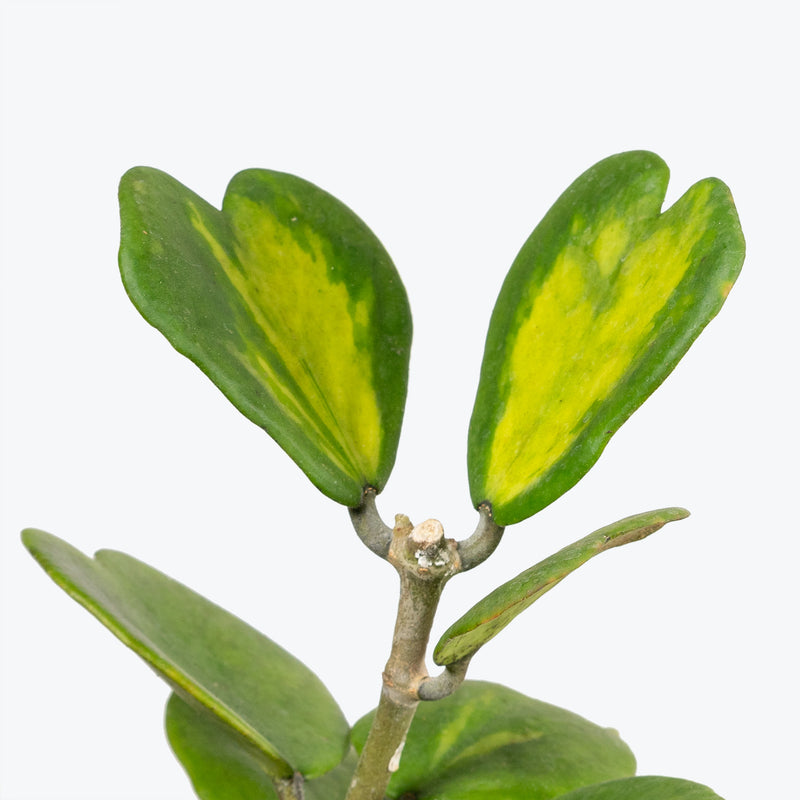
How to care for Hoya Kerrii Reverse Variegata
They should not be in a position to see the sun directly, although early morning or late evening sun is fine. Filtered sunlight through a sheer curtain is best and most homes are comprised primarily of indirect sunlight. The best spot for them is where they do not see the sun during the majority of the day but still get bright, indirect light.
They will thrive in medium to bright light, but also can tolerate low light. A good medium-light place in your home would be in the middle of a room that has a regular size window. They can be placed almost anywhere in the room but remember, plants will grow based on how much light they receive.
They like the soil to be relatively dry before the next watering. That usually takes about 2 weeks in an average home environment. It will vary depending on the time of year, your environment and lighting conditions, but for them, it's always safer to underwater or water when you see signs of lack of water (i.e. droopy, floppy, or soft leaves). Expect to water more often in brighter light and less often in lower light.
They can live in any average home humidity condition and are fairly hardy.
Allow for a well-draining soil mix to ensure the plant doesn't sit in water. During the growing season, consider feeding with a balanced fertilizer once a month to promote growth.
You can feel comfortable having this plant around your home in the potential case where your pet feels like nibbling on it. However, we typically recommend keeping your pets from eating any of your houseplants..
Learn MoreView PlantHoya Kerrii Variegata
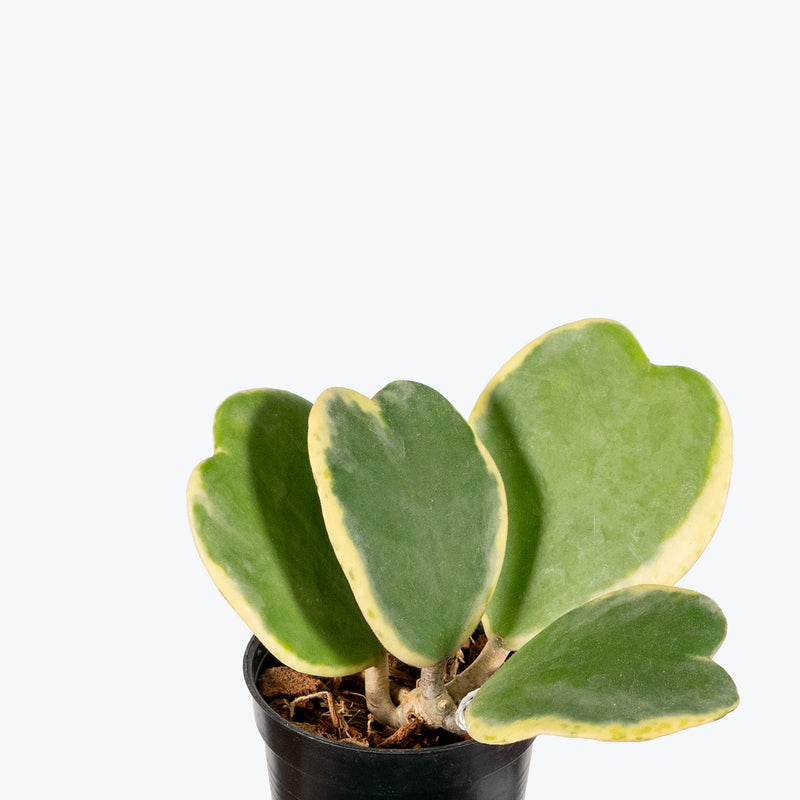
How to care for Hoya Kerrii Variegata
Hoya Kerrii Variegata should not be in a position to see the sun directly, although early morning or late evening sun is fine. Filtered sunlight through a sheer curtain is best and most homes are comprised primarily of indirect sunlight. The best spot for them is where they do not see the sun during the majority of the day but still get bright, indirect light.
Hoya Kerrii Variegata will thrive in medium to bright light, but also can tolerate low light. A good medium-light place in your home would be in the middle of a room that has a regular size window. They can be placed almost anywhere in the room but remember, plants will grow based on how much light they receive.
Hoya Kerrii Variegata likes the soil to be relatively dry before the next watering. That usually takes about 2 weeks in an average home environment. It will vary depending on the time of year, your environment and lighting conditions, but for them, it's always safer to underwater or water when you see signs of lack of water (i.e. droopy, floppy, or soft leaves). Expect to water more often in brighter light and less often in lower light.
Hoya Kerrii Variegata can live in any average home humidity condition and are fairly hardy.
If Hoya Kerrii Variegata is getting too much light you’ll find that the leaves start turning yellow, but still feel firm and healthy. In that case, just move it a little further away from the sun.
You can feel comfortable having Hoya Kerrii Variegata around your home in the potential case where your pet feels like nibbling on it. However, we typically recommend keeping your pets from eating any of your houseplants..
Learn MoreView PlantHoya Krohniana Black
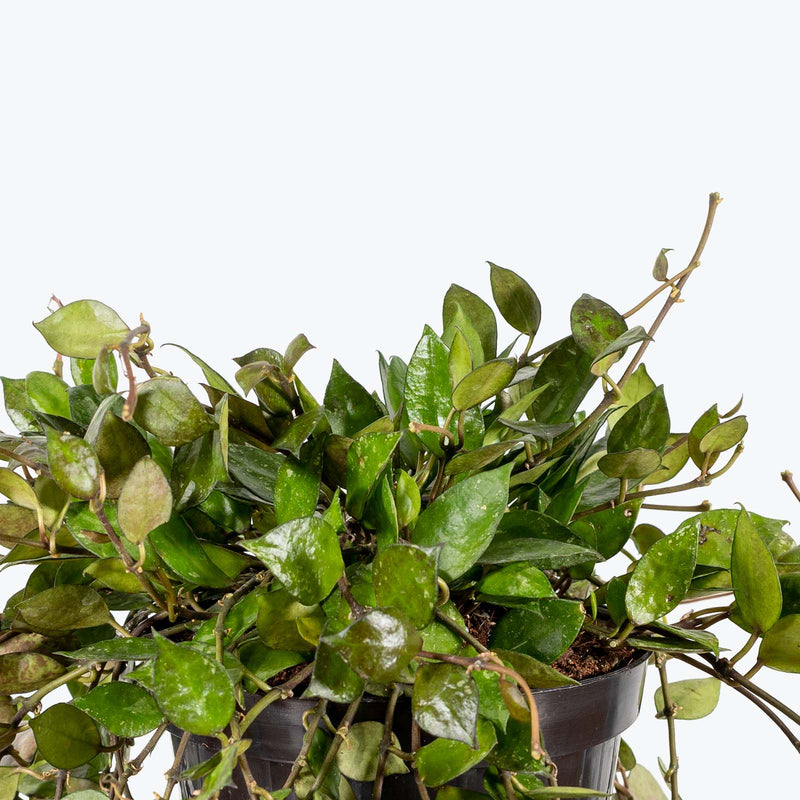
How to care for Hoya Krohniana Black
They should not be in a position to see the sun directly, although early morning or late evening sun is fine. Filtered sunlight through a sheer curtain is best and most homes are comprised primarily of indirect sunlight. The best spot for them is where they do not see the sun during the majority of the day but still get bright, indirect light.
They will thrive in medium to bright light, but also can tolerate low light. A good medium-light place in your home would be in the middle of a room that has a regular size window. They can be placed almost anywhere in the room but remember, plants will grow based on how much light they receive.
They like the soil to be relatively dry before the next watering. That usually takes about 2 weeks in an average home environment. It will vary depending on the time of year, your environment and lighting conditions, but for them, it's always safer to underwater or water when you see signs of lack of water (i.e. droopy, floppy, or soft leaves). Expect to water more often in brighter light and less often in lower light.
They will do well in average humidity environments but will appreciate a little bit of humidity if provided, give them a mist daily or get a humidifier.
When Hoya's are "stressed," which can happen when they are not given enough water or receive too much sun or bright light, they can have some stunning reactions. If you want your plant to bloom, keep the soil dry and keep it in very bright light.
You can feel comfortable having this plant around your home in the potential case where your pet feels like nibbling on it. However, we typically recommend keeping your pets from eating any of your houseplants..
Learn MoreView PlantHoya Krohniana Silver
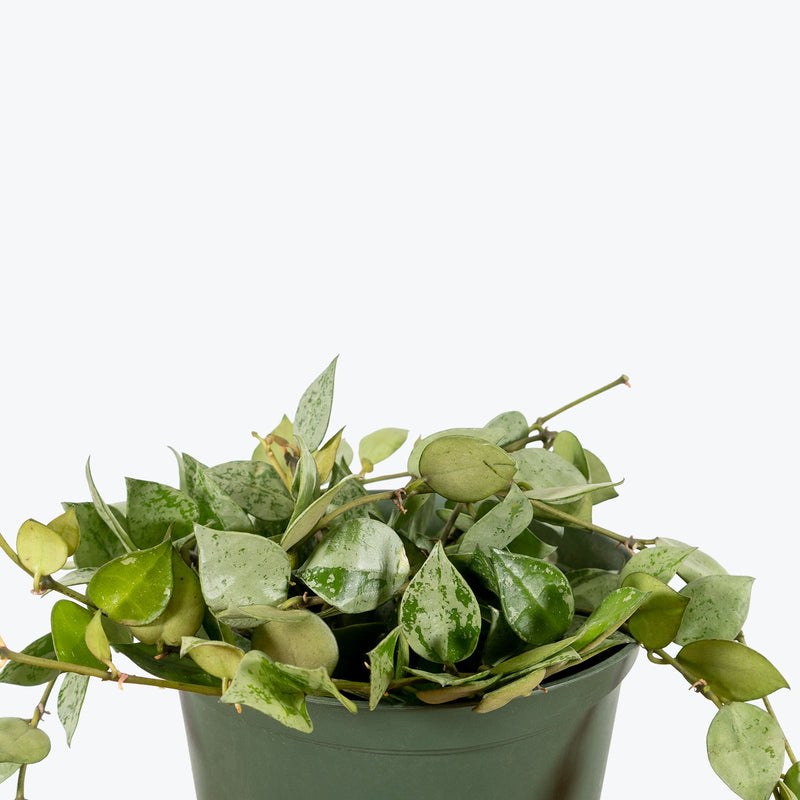
How to care for Hoya Krohniana Silver
Hoya Krohniana Silver should not be in a position to see the sun directly, although early morning or late evening sun is fine. Filtered sunlight through a sheer curtain is best and most homes are comprised primarily of indirect sunlight. The best spot for them is where they do not see the sun during the majority of the day but still get bright, indirect light.
Hoya Krohniana Silver will thrive in medium to bright light, but also can tolerate low light. A good medium-light place in your home would be in the middle of a room that has a regular size window. They can be placed almost anywhere in the room but remember, plants will grow based on how much light they receive.
Hoya Krohniana Silver likes the soil to be relatively dry before the next watering. That usually takes about 2 weeks in an average home environment. It will vary depending on the time of year, your environment and lighting conditions, but for them, it's always safer to underwater or water when you see signs of lack of water (i.e. droopy, floppy, or soft leaves). Expect to water more often in brighter light and less often in lower light.
Hoya Krohniana Silver will do well in average humidity environments but will appreciate a little bit of humidity if provided, give them a mist daily or get a humidifier.
When Hoya Krohniana Silver is "stressed," which can happen when they are not given enough water or receive too much sun or bright light, they can have some stunning reactions. If you want your plant to bloom, keep the soil dry and keep it in very bright light. Plant in a well-draining, airy mix of orchid bark, perlite, and coco husk to replicate its natural epiphytic conditions. Fertilize monthly during spring and summer with a diluted, balanced fertilizer. Hoya Krohniana Silver prefers warm, stable environments — avoid cold drafts or sudden changes in temperature. Encourage flowering by providing steady light, moderate watering, and allowing it to become slightly root-bound.
You can feel comfortable having Hoya Krohniana Silver around your home in the potential case where your pet feels like nibbling on it. However, we typically recommend keeping your pets from eating any of your houseplants..
Learn MoreView PlantHoya Krohniana Splash
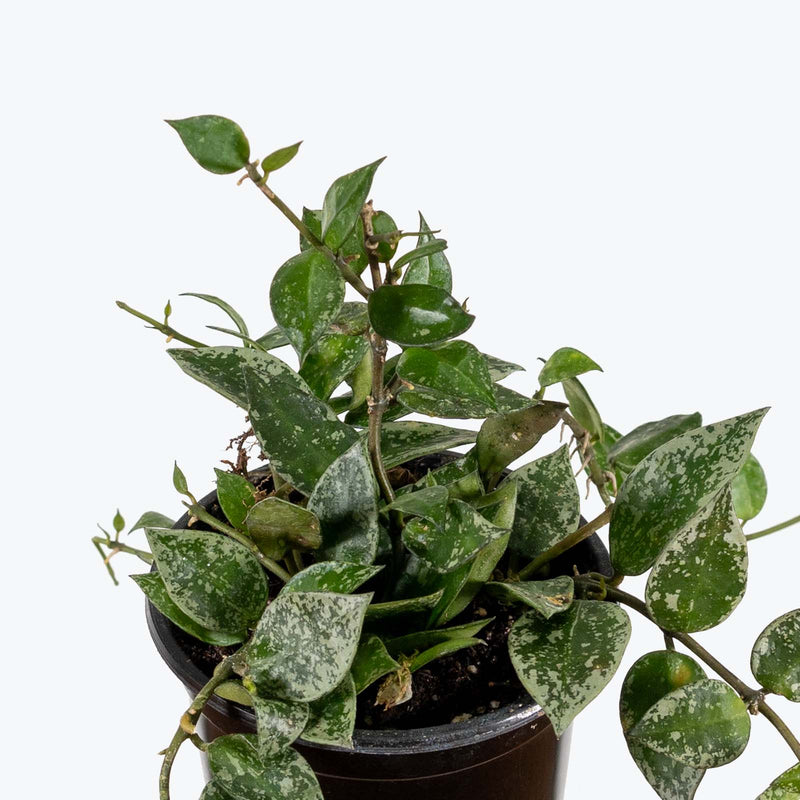
How to care for Hoya Krohniana Splash
Hoya Krohniana Splash should not be in a position to see the sun directly, although early morning or late evening sun is fine. Filtered sunlight through a sheer curtain is best and most homes are comprised primarily of indirect sunlight. The best spot for them is where they do not see the sun during the majority of the day but still get bright, indirect light.
Hoya Krohniana Splash will thrive in medium to bright light, but also can tolerate low light. A good medium-light place in your home would be in the middle of a room that has a regular size window. They can be placed almost anywhere in the room but remember, plants will grow based on how much light they receive.
Hoya Krohniana Splash likes the soil to be relatively dry before the next watering. That usually takes about 2 weeks in an average home environment. It will vary depending on the time of year, your environment and lighting conditions, but for them, it's always safer to underwater or water when you see signs of lack of water (i.e. droopy, floppy, or soft leaves). Expect to water more often in brighter light and less often in lower light.
Hoya Krohniana Splash will do well in average humidity environments but will appreciate a little bit of humidity if provided, give them a mist daily or get a humidifier.
Like most Hoyas, the Hoya Krohniana Splash prefers to be a little root-bound in a well-draining soil mix. Fertilize lightly during the growing season and reduce feeding during the winter months. This Hoya variety can be propagated through stem cuttings.
You can feel comfortable having Hoya Krohniana Splash around your home in the potential case where your pet feels like nibbling on it. However, we typically recommend keeping your pets from eating any of your houseplants..
Learn MoreView PlantHoya Lacunosa
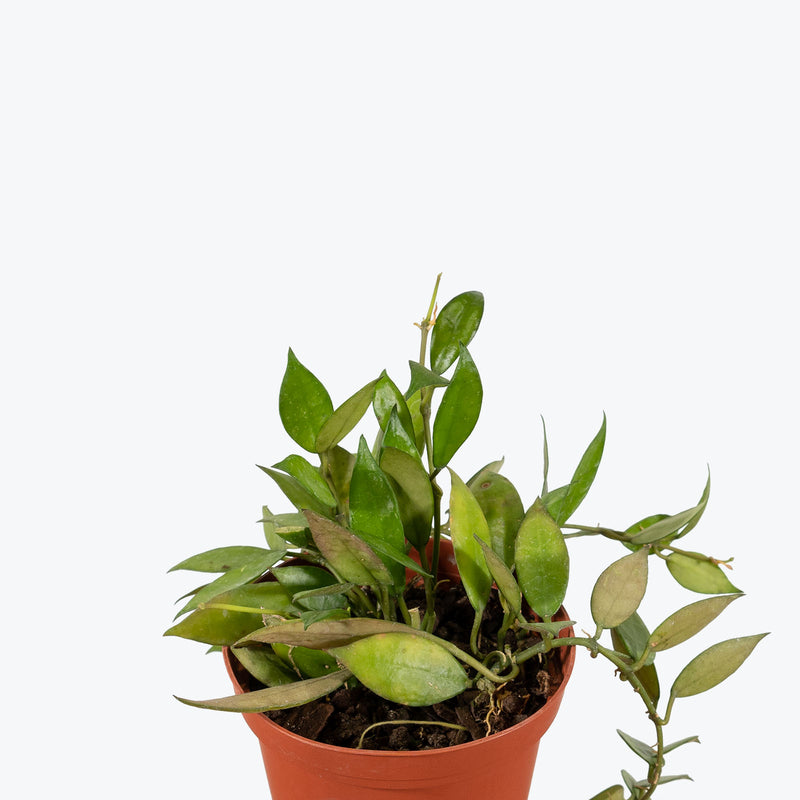
How to care for Hoya Lacunosa
Hoya Lacunosa should not be in a position to see the sun directly, although early morning or late evening sun is fine. Filtered sunlight through a sheer curtain is best and most homes are comprised primarily of indirect sunlight. The best spot for them is where they do not see the sun during the majority of the day but still get bright, indirect light.
Hoya Lacunosa will do well in medium light but will grow faster with brighter light. A good medium-light place in your home would be in the middle of a room that has a regular size window. Remember that plants will grow based on how much light they receive.
Hoya Lacunosa likes the soil to be relatively dry before the next watering. That usually takes about 2 weeks in an average home environment. It will vary depending on the time of year, your environment and lighting conditions, but for them, it's always safer to underwater or water when you see signs of lack of water (i.e. droopy, floppy, or soft leaves). Expect to water more often in brighter light and less often in lower light.
Hoya Lacunosa will do well in average humidity environments but will appreciate a little bit of humidity if provided, give them a mist daily or get a humidifier.
Hang your Hoya Lacunosa at a level where it will still get bright light at the top of the plant; otherwise, it will start to look bald. Plant in a light, airy mix of orchid bark, perlite, and coco coir or peat. Fertilize every 4–6 weeks during spring and summer with a diluted balanced fertilizer. Allow the plant to become slightly root-bound to encourage blooming. Do not remove old flower spurs—Hoyas rebloom from the same spots. Leaf shape and size may vary depending on light and growing conditions, adding to its charm.
You can feel comfortable having Hoya Lacunosa around your home in the potential case where your pet feels like nibbling on it. However, we typically recommend keeping your pets from eating any of your houseplants..
Learn MoreView PlantHoya Lacunosa Mint

How to care for Hoya Lacunosa Mint
Hoya Lacunosa Mint should not be in a position to see the sun directly, although early morning or late evening sun is fine. Filtered sunlight through a sheer curtain is best and most homes are comprised primarily of indirect sunlight. The best spot for them is where they do not see the sun during the majority of the day but still get bright, indirect light.
Hoya Lacunosa Mint will thrive in bright light, but also can tolerate medium light. A good medium-light place in your home would be in the middle of a room that has a regular size window. They can be placed anywhere between the middle of the room and the window. Remember that plants will grow based on how much light they receive.
Hoya Lacunosa Mint likes the soil to be relatively dry before the next watering. That usually takes about 2 weeks in an average home environment. It will vary depending on the time of year, your environment and lighting conditions, but for them, it's always safer to underwater or water when you see signs of lack of water (i.e. droopy, floppy, or soft leaves). Expect to water more often in brighter light and less often in lower light.
Hoya Lacunosa Mint will do well in average humidity environments but will appreciate a little bit of humidity if provided, give them a mist daily or get a humidifier.
Feed Hoya Lacunosa Mint regularly during the growing season with a low-nitrogen fertilizer that contains adequate phosphorous and potassium to support flowering. Do not remove the peduncles (flower stalks) after blooming as Hoyas can rebloom from the same peduncle multiple times.
You can feel comfortable having Hoya Lacunosa Mint around your home in the potential case where your pet feels like nibbling on it. However, we typically recommend keeping your pets from eating any of your houseplants..
Learn MoreView PlantHoya Latifolia Pot of Gold

How to care for Hoya Latifolia Pot of Gold
Hoya Latifolia Pot of Gold should not be in a position to see the sun directly, although early morning or late evening sun is fine. Filtered sunlight through a sheer curtain is best and most homes are comprised primarily of indirect sunlight. The best spot for them is where they do not see the sun during the majority of the day but still get bright, indirect light.
Hoya Latifolia Pot of Gold will thrive in bright light, but also can tolerate medium light. A good medium-light place in your home would be in the middle of a room that has a regular size window. They can be placed anywhere between the middle of the room and the window. Remember that plants will grow based on how much light they receive.
Hoya Latifolia Pot of Gold likes the soil to be relatively dry before the next watering. That usually takes about 2 weeks in an average home environment. It will vary depending on the time of year, your environment and lighting conditions, but for them, it's always safer to underwater or water when you see signs of lack of water (i.e. droopy, floppy, or soft leaves). Expect to water more often in brighter light and less often in lower light.
Hoya Latifolia Pot of Gold likes a high humidity environment, give them a mist daily or as often as possible. Alternatively, you can put them around a humidifier. Although they won't die if they don't receive enough humidity, their leaves may have some dry, crunchy, or yellow edges.
Use a light, airy mix of orchid bark, perlite, and coco coir to mimic its natural epiphytic environment. Fertilize every 4–6 weeks during spring and summer with a diluted, balanced fertilizer. Train or support vines as they grow to showcase the foliage pattern. Hoya Latifolia Pot of Gold appreciates warmth and consistent conditions—avoid cold drafts. Given time and proper light, it rewards growers with clusters of sweetly scented blooms.
You can feel comfortable having Hoya Latifolia Pot of Gold around your home in the potential case where your pet feels like nibbling on it. However, we typically recommend keeping your pets from eating any of your houseplants..
Learn MoreView PlantHoya Linearis
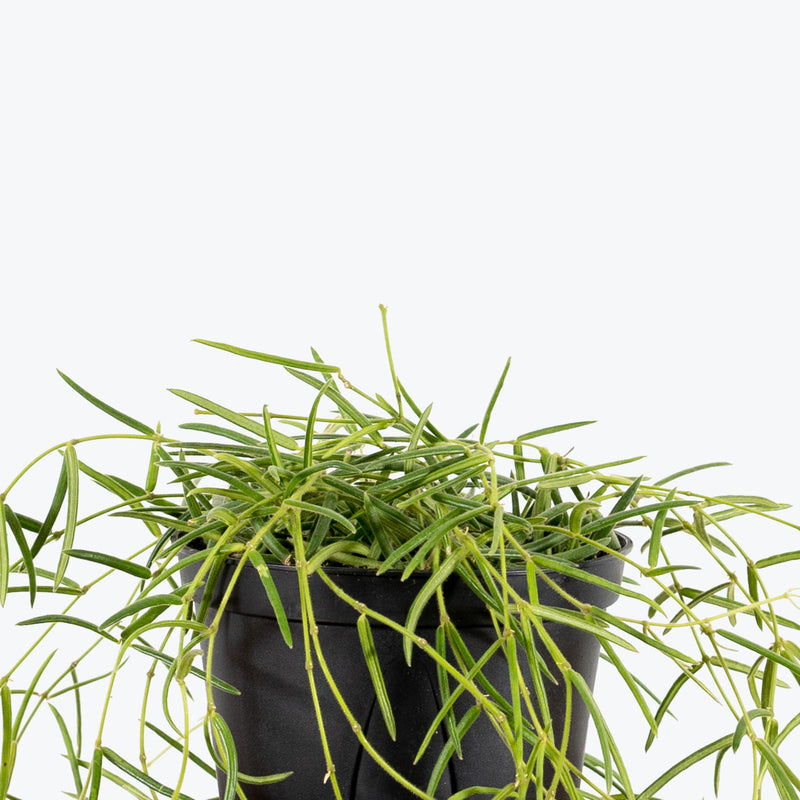
How to care for Hoya Linearis
They should not be in a position to see the sun directly, although early morning or late evening sun is fine. Filtered sunlight through a sheer curtain is best and most homes are comprised primarily of indirect sunlight. The best spot for them is where they do not see the sun during the majority of the day but still get bright, indirect light.
They will do best in bright light. A nice bright place inside your home would be on the window sill or a stool that is right next to a window, either with or without blinds, depending on if the plant can handle sun. Remember that plants will grow based on how much light they receive.
They need to be watered when the top half of the soil is dry to the touch. That usually takes about 1 week in an average home environment. It will vary depending on the time of year, your environment and lighting conditions, but it's always safer to underwater or give the soil a check before you water again. Expect to water more often in brighter light and less often in lower light.
They will do well in average humidity environments but will appreciate a little bit of humidity if provided, give them a mist daily or get a humidifier.
Hang your Hoya at a level where it will still get bright light at the top of the plant; otherwise, it will start to look bald. Reduce the frequency of waterings during the winter months as the days are much shorter and typically overcast (i.e. darker).
You can feel comfortable having this plant around your home in the potential case where your pet feels like nibbling on it. However, we typically recommend keeping your pets from eating any of your houseplants..
Learn MoreView PlantHoya Macrophylla Variegata
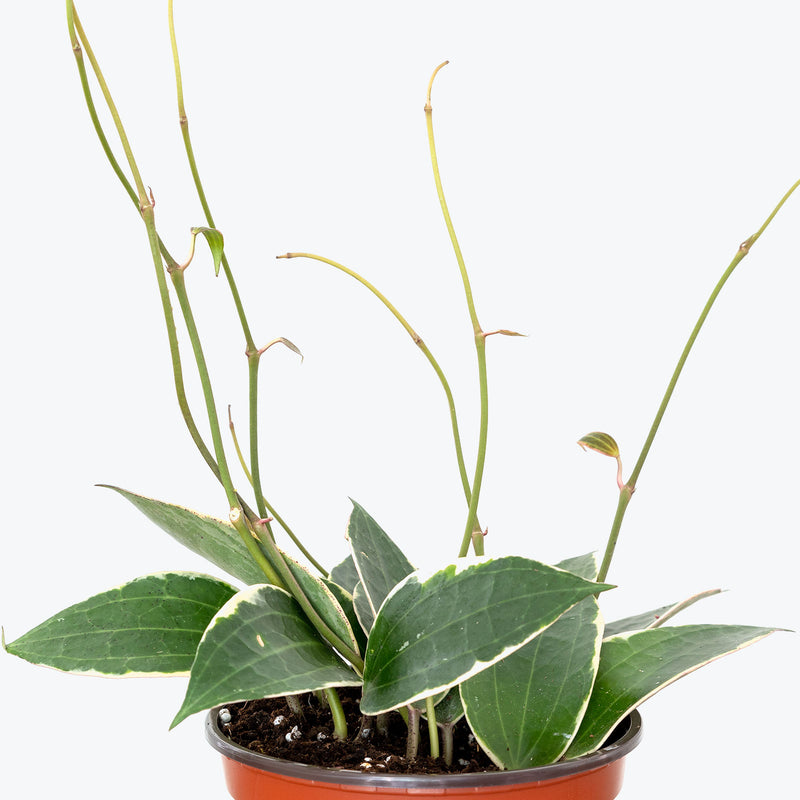
How to care for Hoya Macrophylla Variegata
They should not be in a position to see the sun directly, although early morning or late evening sun is fine. Filtered sunlight through a sheer curtain is best and most homes are comprised primarily of indirect sunlight. The best spot for them is where they do not see the sun during the majority of the day but still get bright, indirect light.
They will do well in medium light but will grow faster with brighter light. A good medium-light place in your home would be in the middle of a room that has a regular size window. Remember that plants will grow based on how much light they receive.
They like the soil to be relatively dry before the next watering. That usually takes about 2 weeks in an average home environment. It will vary depending on the time of year, your environment and lighting conditions, but for them, it's always safer to underwater or water when you see signs of lack of water (i.e. droopy, floppy, or soft leaves). Water more often in the warmer months.
They can live in any average home humidity condition and are fairly hardy.
If it is getting too much light you’ll find that the leaves start turning yellow, but still feel firm and healthy. In that case, just move it a little further away from the sun.
You can feel comfortable having this plant around your home in the potential case where your pet feels like nibbling on it. However, we typically recommend keeping your pets from eating any of your houseplants..
Learn MoreView PlantHoya Mathilde

How to care for Hoya Mathilde
Hoya Mathilde should not be in a position to see the sun directly, although early morning or late evening sun is fine. Filtered sunlight through a sheer curtain is best and most homes are comprised primarily of indirect sunlight. The best spot for them is where they do not see the sun during the majority of the day but still get bright, indirect light.
Hoya Mathilde will thrive in bright light, but also can tolerate medium light. A good medium-light place in your home would be in the middle of a room that has a regular size window. They can be placed anywhere between the middle of the room and the window. Remember that plants will grow based on how much light they receive.
Hoya Mathilde likes the soil to be relatively dry before the next watering. That usually takes about 2 weeks in an average home environment. It will vary depending on the time of year, your environment and lighting conditions, but for them, it's always safer to underwater or water when you see signs of lack of water (i.e. droopy, floppy, or soft leaves). Expect to water more often in brighter light and less often in lower light.
Hoya Mathilde can live in any average home humidity condition and are fairly hardy.
Hoya Mathilde appreciates being slightly root-bound — avoid repotting too frequently. Use a chunky, fast-draining soil mix (such as orchid bark blended with perlite and peat). Consistent bright indirect light is key to bringing out the silver splashes and encouraging blooms. Once buds form, avoid moving the plant, as Hoyas can drop their flowers with sudden changes. During the growing season, feed monthly with a diluted fertilizer high in potassium to support blooming.
You can feel comfortable having Hoya Mathilde around your home in the potential case where your pet feels like nibbling on it. However, we typically recommend keeping your pets from eating any of your houseplants..
Learn MoreView PlantHoya Mathilde Splash

How to care for Hoya Mathilde Splash
Hoya Mathilde Splash should not be in a position to see the sun directly, although early morning or late evening sun is fine. Filtered sunlight through a sheer curtain is best and most homes are comprised primarily of indirect sunlight. The best spot for them is where they do not see the sun during the majority of the day but still get bright, indirect light.
Hoya Mathilde Splash will thrive in bright light, but also can tolerate medium light. A good medium-light place in your home would be in the middle of a room that has a regular size window. They can be placed anywhere between the middle of the room and the window. Remember that plants will grow based on how much light they receive.
Hoya Mathilde Splash likes the soil to be relatively dry before the next watering. That usually takes about 2 weeks in an average home environment. It will vary depending on the time of year, your environment and lighting conditions, but for them, it's always safer to underwater or water when you see signs of lack of water (i.e. droopy, floppy, or soft leaves). Expect to water more often in brighter light and less often in lower light.
Hoya Mathilde Splash can live in any average home humidity condition and are fairly hardy.
Use a well-draining, chunky mix (orchid bark, perlite, and peat or coco coir) to mimic its epiphytic roots. Fertilize Hoya Mathilde Splash monthly in spring and summer with a diluted fertilizer to encourage blooming. Be patient—Hoyas often bloom only after they are mature and slightly root-bound. Leave spent peduncles on the plant, as they will rebloom from the same points.
You can feel comfortable having Hoya Mathilde Splash around your home in the potential case where your pet feels like nibbling on it. However, we typically recommend keeping your pets from eating any of your houseplants..
Learn MoreView PlantHoya Memoria
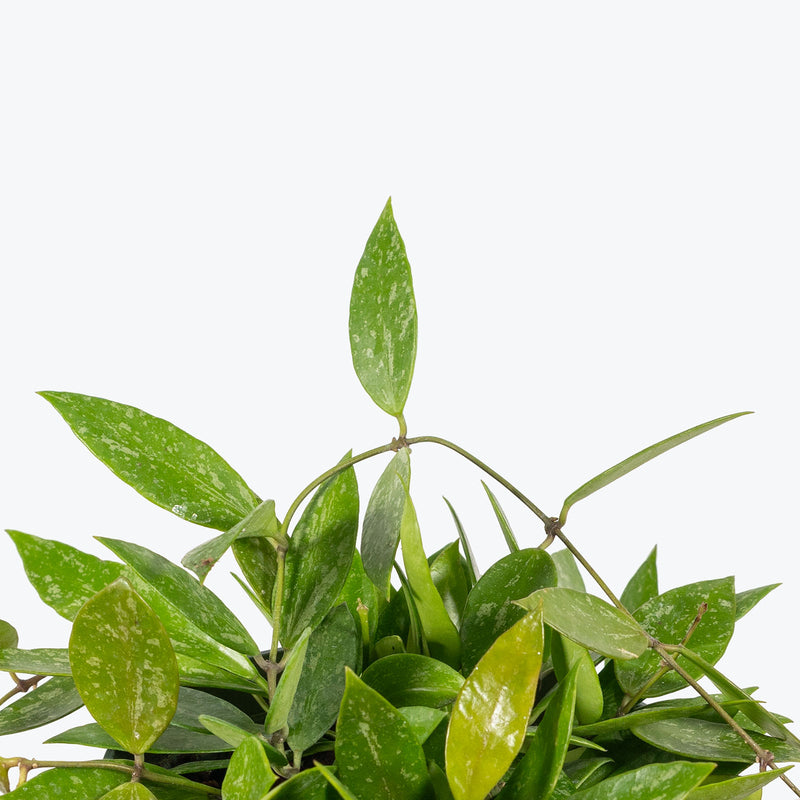
How to care for Hoya Memoria
Hoya Memoria should not be in a position to see the sun directly, although early morning or late evening sun is fine. Filtered sunlight through a sheer curtain is best and most homes are comprised primarily of indirect sunlight. The best spot for them is where they do not see the sun during the majority of the day but still get bright, indirect light.
Hoya Memoria will thrive in medium to bright light, but also can tolerate low light. A good medium-light place in your home would be in the middle of a room that has a regular size window. They can be placed almost anywhere in the room but remember, plants will grow based on how much light they receive.
Hoya Memoria likes the soil to be relatively dry before the next watering. That usually takes about 2 weeks in an average home environment. It will vary depending on the time of year, your environment and lighting conditions, but for them, it's always safer to underwater or water when you see signs of lack of water (i.e. droopy, floppy, or soft leaves). Expect to water more often in brighter light and less often in lower light.
Hoya Memoria will do well in average humidity environments but will appreciate a little bit of humidity if provided, give them a mist daily or get a humidifier.
Fertilize Hoya Memoria with a balanced, water-soluble fertilizer diluted to half strength every month during the growing season (spring and summer). Reduce feeding in the winter months when growth naturally slows. Provide a support structure for climbing or allow the vines to hang from a basket. Pruning can be done after the flowering season to maintain the plant's shape and promote more vigorous growth.
You can feel comfortable having Hoya Memoria around your home in the potential case where your pet feels like nibbling on it. However, we typically recommend keeping your pets from eating any of your houseplants..
Learn MoreView PlantHoya Nummularioides
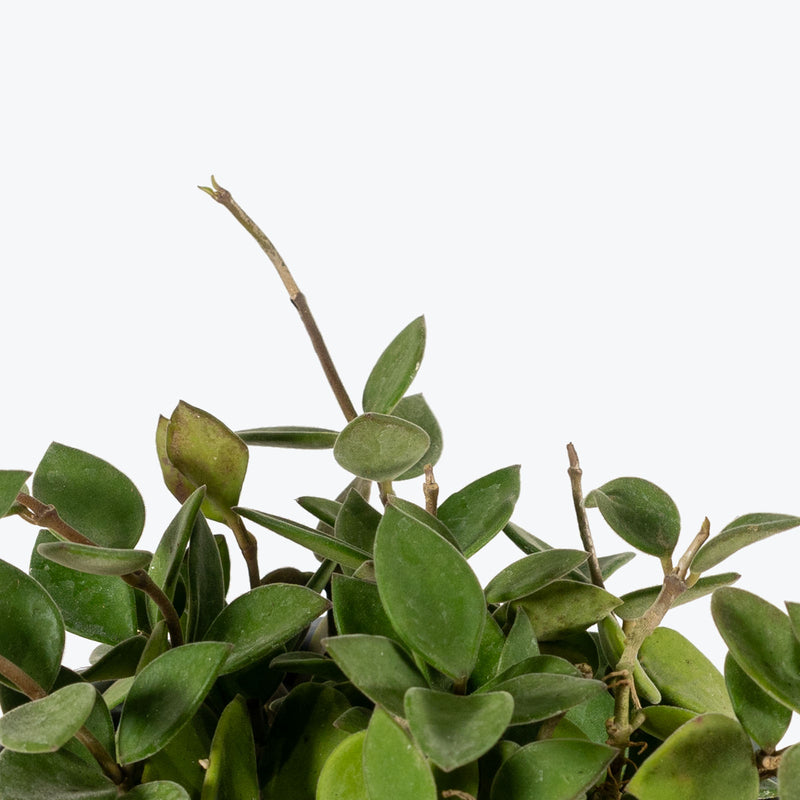
How to care for Hoya Nummularioides
Hoya Nummularioides should not be in a position to see the sun directly, although early morning or late evening sun is fine. Filtered sunlight through a sheer curtain is best and most homes are comprised primarily of indirect sunlight. The best spot for them is where they do not see the sun during the majority of the day but still get bright, indirect light.
Hoya Nummularioides will thrive in medium to bright light, but also can tolerate low light. A good medium-light place in your home would be in the middle of a room that has a regular size window. They can be placed almost anywhere in the room but remember, plants will grow based on how much light they receive.
Hoya Nummularioides likes the soil to be relatively dry before the next watering. That usually takes about 2 weeks in an average home environment. It will vary depending on the time of year, your environment and lighting conditions, but for them, it's always safer to underwater or water when you see signs of lack of water (i.e. droopy, floppy, or soft leaves). Expect to water more often in brighter light and less often in lower light.
Hoya Nummularioides will do well in average humidity environments but will appreciate a little bit of humidity if provided, give them a mist daily or get a humidifier.
Feed Hoya Nummularioides with a diluted liquid fertilizer every 4-6 weeks during the growing season. Reduce feeding in the winter when the plant’s growth naturally slows. Regularly check for pests, as Hoyas can be susceptible to mealybugs and aphids. Support the climbing habit with a trellis or allow it to trail from a hanging basket for a beautiful display.
You can feel comfortable having Hoya Nummularioides around your home in the potential case where your pet feels like nibbling on it. However, we typically recommend keeping your pets from eating any of your houseplants..
Learn MoreView PlantHoya Obovata
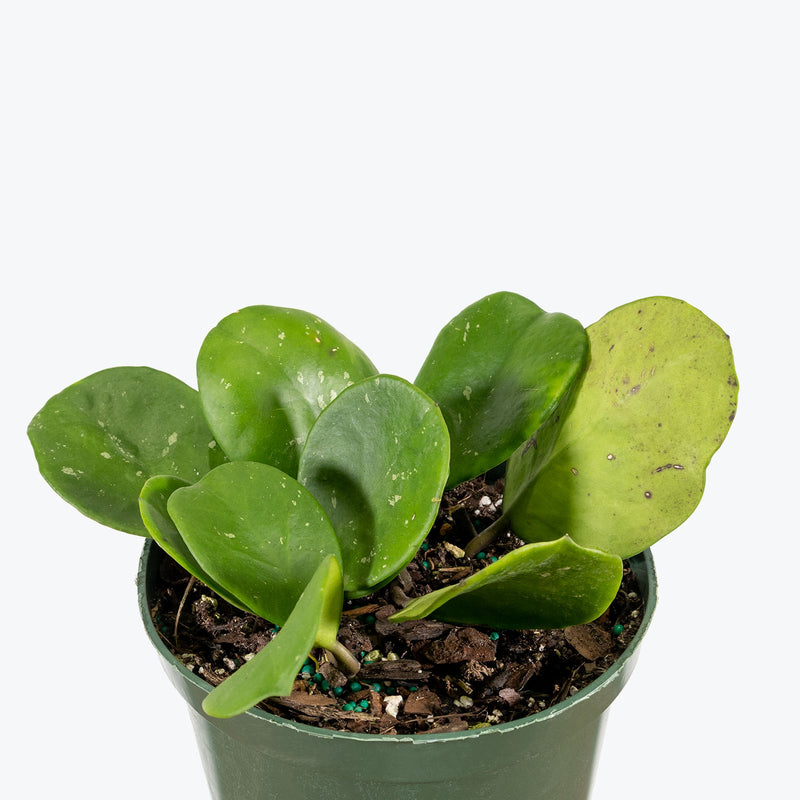
How to care for Hoya Obovata
They should not be in a position to see the sun directly, although early morning or late evening sun is fine. Filtered sunlight through a sheer curtain is best and most homes are comprised primarily of indirect sunlight. The best spot for them is where they do not see the sun during the majority of the day but still get bright, indirect light.
They will thrive in bright light, but also can tolerate medium light. A good medium-light place in your home would be in the middle of a room that has a regular size window. They can be placed anywhere between the middle of the room and the window. Remember that plants will grow based on how much light they receive.
They like the soil to be relatively dry before the next watering. That usually takes about 2 weeks in an average home environment. It will vary depending on the time of year, your environment and lighting conditions, but for them, it's always safer to underwater or water when you see signs of lack of water (i.e. droopy, floppy, or soft leaves). Expect to water more often in brighter light and less often in lower light.
They can live in any average home humidity condition and are fairly hardy.
When Hoya's are "stressed," which can happen when they are not given enough water or receive too much sun or bright light, they can have some stunning reactions. If you want your plant to bloom, keep the soil dry, if you want the foliage to turn different shades of pinks, reds, or purples, depending on the plant, keep them in very bright light.
You can feel comfortable having this plant around your home in the potential case where your pet feels like nibbling on it. However, we typically recommend keeping your pets from eating any of your houseplants..
Learn MoreView PlantHoya Pachyclada
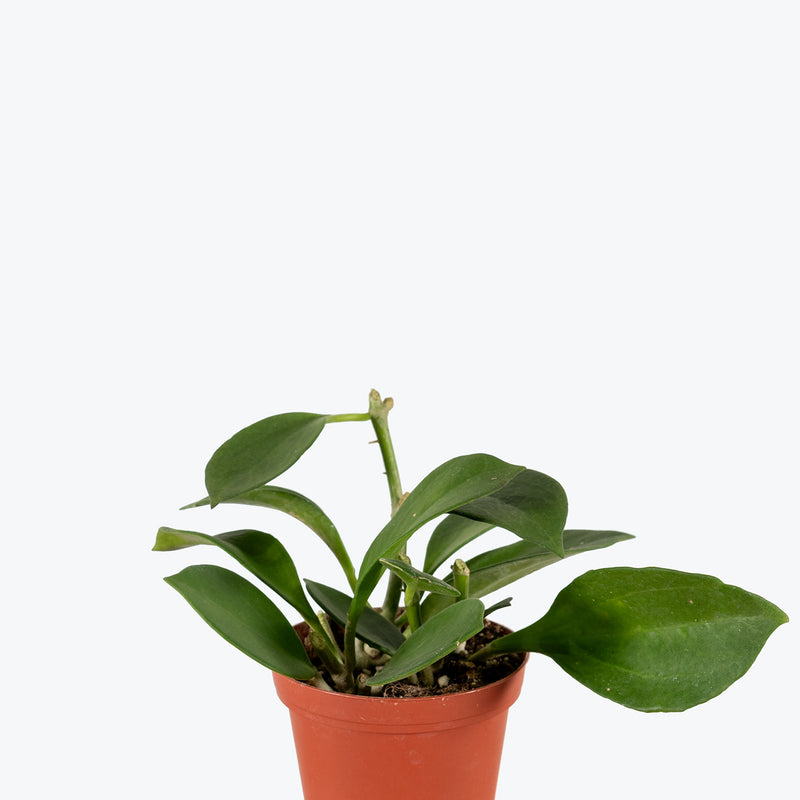
How to care for Hoya Pachyclada
Hoya Pachyclada should not be in a position to see the sun directly, although early morning or late evening sun is fine. Filtered sunlight through a sheer curtain is best and most homes are comprised primarily of indirect sunlight. The best spot for them is where they do not see the sun during the majority of the day but still get bright, indirect light.
Hoya Pachyclada will do well in medium light but will grow faster with brighter light. A good medium-light place in your home would be in the middle of a room that has a regular size window. Remember that plants will grow based on how much light they receive.
Hoya Pachyclada likes the soil to be relatively dry before the next watering. That usually takes about 2 weeks in an average home environment. It will vary depending on the time of year, your environment and lighting conditions, but for them, it's always safer to underwater or water when you see signs of lack of water (i.e. droopy, floppy, or soft leaves). Expect to water more often in brighter light and less often in lower light.
Hoya Pachyclada will do well in average humidity environments but will appreciate a little bit of humidity if provided, give them a mist daily or get a humidifier.
Feed Hoya Pachyclada with a balanced liquid fertilizer every 4-6 weeks during the spring and summer, reducing to once every 8 weeks in fall and winter. Regularly check for pests like mealybugs and aphids, common in Hoyas. Support with a trellis or allow to trail from a hanging basket to display its natural beauty.
You can feel comfortable having Hoya Pachyclada around your home in the potential case where your pet feels like nibbling on it. However, we typically recommend keeping your pets from eating any of your houseplants..
Learn MoreView PlantHoya Parasitica Black Margin

How to care for Hoya Parasitica Black Margin
Hoya Parasitica Black Margin should not be in a position to see the sun directly, although early morning or late evening sun is fine. Filtered sunlight through a sheer curtain is best and most homes are comprised primarily of indirect sunlight. The best spot for them is where they do not see the sun during the majority of the day but still get bright, indirect light.
Hoya Parasitica Black Margin will do best in bright light. A nice bright place inside your home would be on the window sill or a stool that is right next to a window, either with or without blinds, depending on if the plant can handle sun. Remember that plants will grow based on how much light they receive.
Hoya Parasitica Black Margin needs to be watered when the top half of the soil is dry to the touch. That usually takes about 1 week in an average home environment. It will vary depending on the time of year, your environment and lighting conditions, but it's always safer to underwater or give the soil a check before you water again. Expect to water more often in brighter light and less often in lower light.
Hoya Parasitica Black Margin will do well in average humidity environments but will appreciate a little bit of humidity if provided, give them a mist daily or get a humidifier.
Hang your Hoya Parasitica Black Margin at a level where it will still get bright light at the top of the plant; otherwise, it will start to look bald. Reduce the frequency of watering during the winter months as the days are much shorter and typically overcast (i.e. darker). To promote fuller growth and maintain plant shape, prune sparingly after the flowering season.
You can feel comfortable having Hoya Parasitica Black Margin around your home in the potential case where your pet feels like nibbling on it. However, we typically recommend keeping your pets from eating any of your houseplants..
Learn MoreView PlantHoya Parasitica Splash
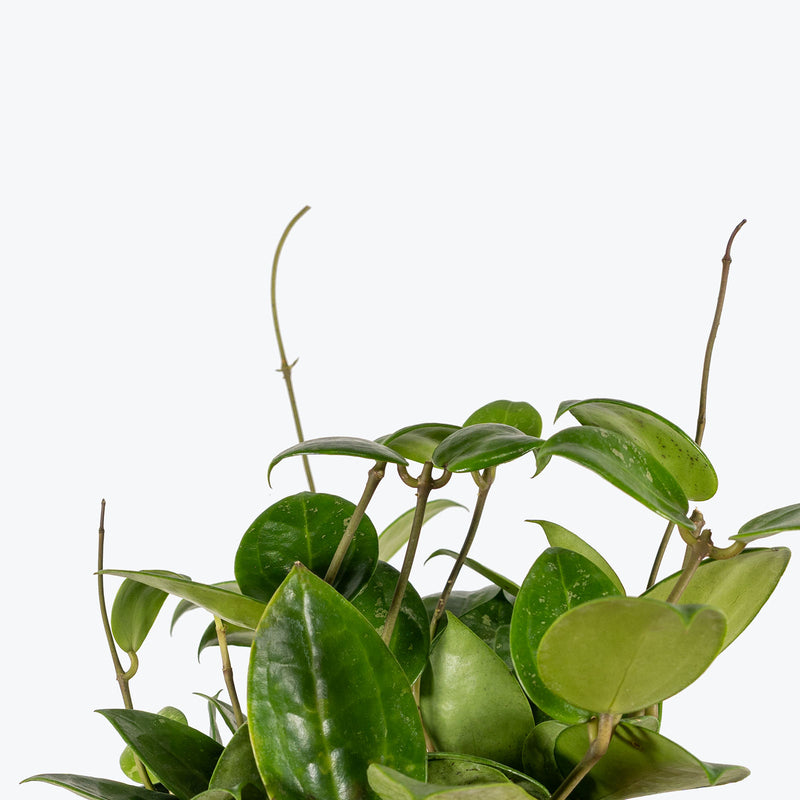
How to care for Hoya Parasitica Splash
Hoya Parasitica Splash should not be in a position to see the sun directly, although early morning or late evening sun is fine. Filtered sunlight through a sheer curtain is best and most homes are comprised primarily of indirect sunlight. The best spot for them is where they do not see the sun during the majority of the day but still get bright, indirect light.
Hoya Parasitica Splash will do best in bright light. A nice bright place inside your home would be on the window sill or a stool that is right next to a window, either with or without blinds, depending on if the plant can handle sun. Remember that plants will grow based on how much light they receive.
Hoya Parasitica Splash needs to be watered when the top half of the soil is dry to the touch. That usually takes about 1 week in an average home environment. It will vary depending on the time of year, your environment and lighting conditions, but it's always safer to underwater or give the soil a check before you water again. Expect to water more often in brighter light and less often in lower light.
Hoya Parasitica Splash will do well in average humidity environments but will appreciate a little bit of humidity if provided, give them a mist daily or get a humidifier.
Avoid fertilization Hoya Parasitica Splash in the winter when the plant's growth naturally slows. Regular pruning can help maintain a desirable shape and promote fuller growth. Support the vining habit with a trellis or allow it to trail from a hanging planter.
You can feel comfortable having Hoya Parasitica Splash around your home in the potential case where your pet feels like nibbling on it. However, we typically recommend keeping your pets from eating any of your houseplants..
Learn MoreView PlantHoya Pubicalyx
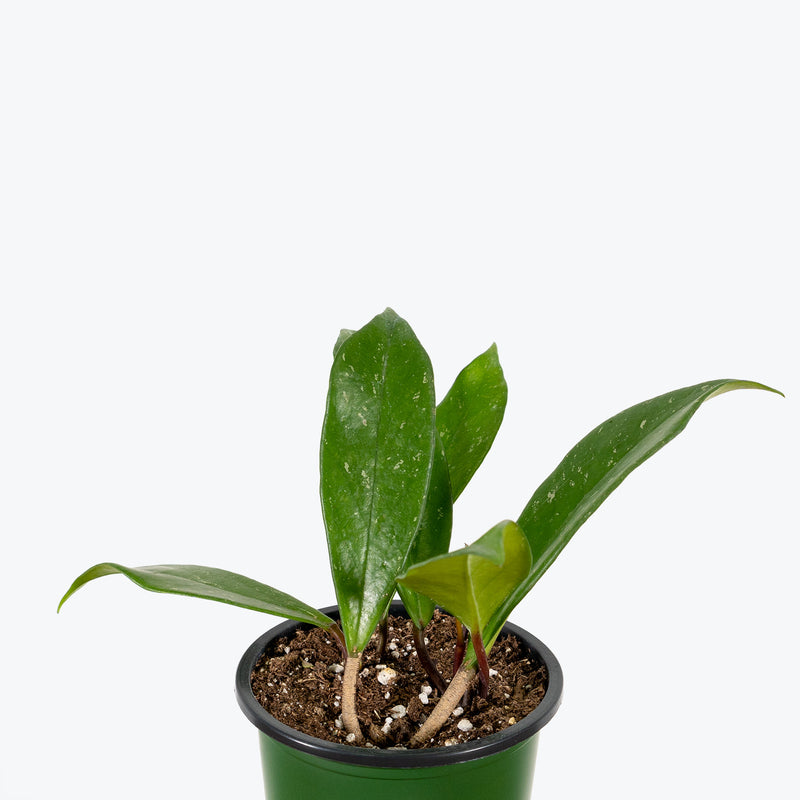
How to care for Hoya Pubicalyx
Hoya pubicalyx should not be in a position to see the sun directly, although early morning or late evening sun is fine. Filtered sunlight through a sheer curtain is best and most homes are comprised primarily of indirect sunlight. The best spot for them is where they do not see the sun during the majority of the day but still get bright, indirect light.
Hoya pubicalyx will thrive in medium to bright light, but also can tolerate low light. A good medium-light place in your home would be in the middle of a room that has a regular size window. They can be placed almost anywhere in the room but remember, plants will grow based on how much light they receive.
Hoya pubicalyx likes the soil to be completely dry before the next watering. That usually takes about 4 weeks in an average home environment. It will vary depending on the time of year, your environment and lighting conditions, but for them, it's always safer to underwater or water when you see signs of lack of water (i.e. wrinkly or soft leaves). Water a little more often in the warmer months.
Hoya pubicalyx can live in any average home humidity condition and are fairly hardy.
If Hoya pubicalyx is getting too much light you’ll find that the leaves start turning yellow, but still feel firm and healthy. In that case, just move it a little further away from the sun. During the winter months, reduce watering and suspend fertilization as the plant enters a dormant period. Provide a trellis or support for the vines to climb, which can encourage better growth and flowering.
You can feel comfortable having Hoya pubicalyx around your home in the potential case where your pet feels like nibbling on it. However, we typically recommend keeping your pets from eating any of your houseplants..
Learn MoreView PlantHoya Pubicalyx Silver Splash
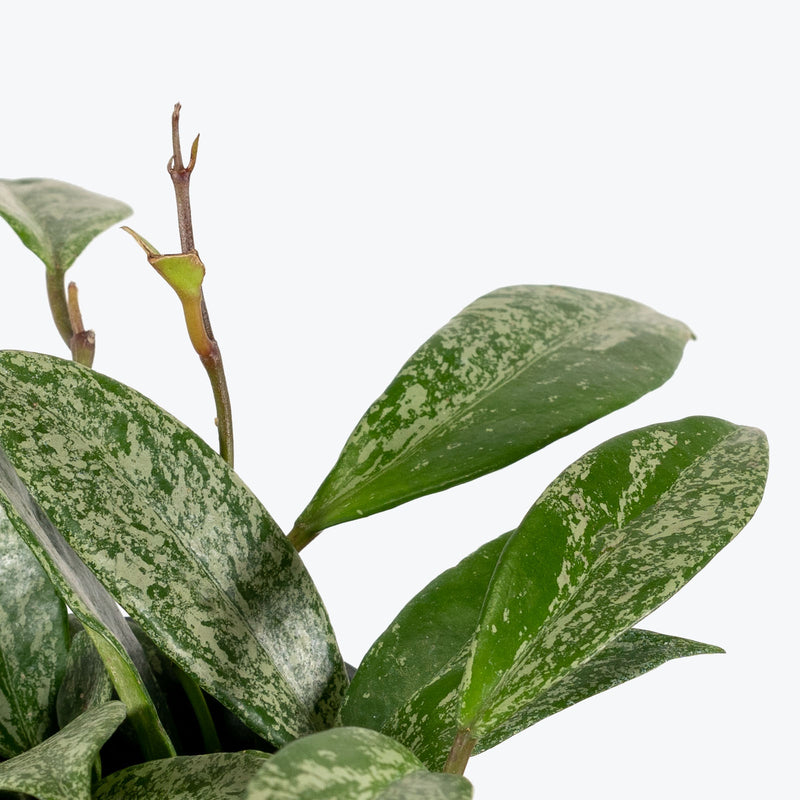
How to care for Hoya Pubicalyx Silver Splash
Hoya Pubicalyx Silver Splash enjoys some direct sun, but they'll also do well in bright, indirect light. It is best to place this plant somewhere where it will receive some nice morning sun, or a couple hours of afternoon sun, and then indirect light for the rest of the day.
Hoya Pubicalyx Silver Splash will thrive in bright light, but also can tolerate medium light. A good medium-light place in your home would be in the middle of a room that has a regular size window. They can be placed anywhere between the middle of the room and the window. Remember that plants will grow based on how much light they receive.
Hoya Pubicalyx Silver Splash likes the soil to be relatively dry before the next watering. That usually takes about 2 weeks in an average home environment. It will vary depending on the time of year, your environment and lighting conditions, but for them, it's always safer to underwater or water when you see signs of lack of water (i.e. droopy, floppy, or soft leaves). Expect to water more often in brighter light and less often in lower light.
Hoya Pubicalyx Silver Splash will do well in average humidity environments but will appreciate a little bit of humidity if provided, give them a mist daily or get a humidifier.
To bring out the strongest silver variegation and purple hues, place your Hoya Pubicalyx Silver Splash in bright, indirect light. Be patient with blooming — Hoyas often need to be slightly root-bound before producing flowers. Avoid removing old flower spurs, as they rebloom from the same spots year after year. Use a chunky, well-draining soil mix (such as orchid bark, perlite, and peat) to mimic their natural epiphytic conditions. Fertilize lightly once a month during spring and summer to encourage vigorous growth and flowering.
You can feel comfortable having Hoya Pubicalyx Silver Splash around your home in the potential case where your pet feels like nibbling on it. However, we typically recommend keeping your pets from eating any of your houseplants..
Learn MoreView PlantHoya Quinquenervia
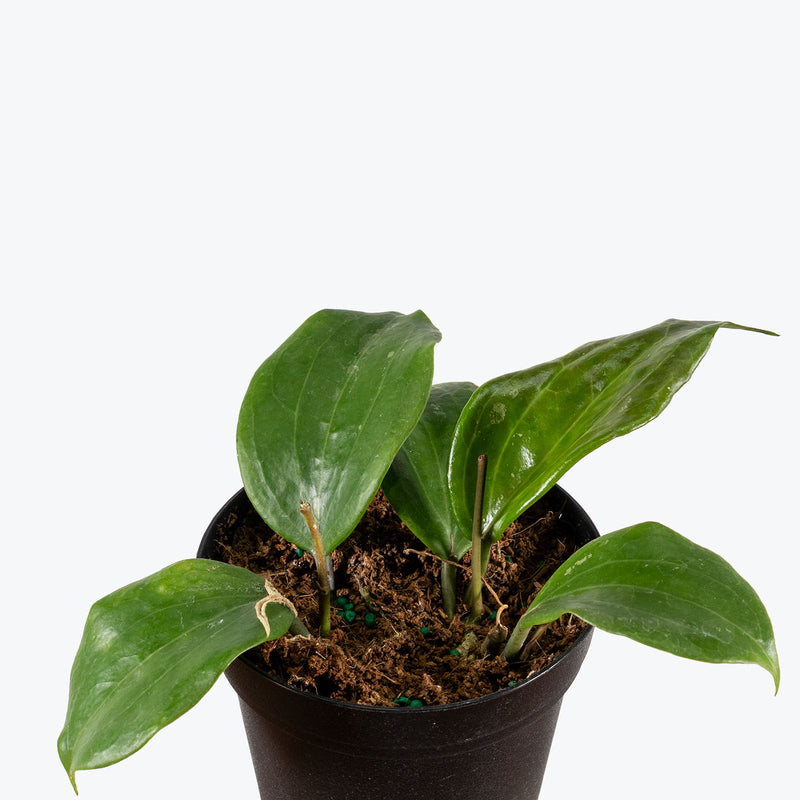
How to care for Hoya Quinquenervia
Hoya Quinquenervia should not be in a position to see the sun directly, although early morning or late evening sun is fine. Filtered sunlight through a sheer curtain is best and most homes are comprised primarily of indirect sunlight. The best spot for them is where they do not see the sun during the majority of the day but still get bright, indirect light.
Hoya Quinquenervia will thrive in bright light, but also can tolerate medium light. A good medium-light place in your home would be in the middle of a room that has a regular size window. They can be placed anywhere between the middle of the room and the window. Remember that plants will grow based on how much light they receive.
Hoya Quinquenervia needs to be watered when the top half of the soil is dry to the touch. That usually takes about 1 week in an average home environment. It will vary depending on the time of year, your environment and lighting conditions, but it's always safer to underwater or give the soil a check before you water again. Expect to water more often in brighter light and less often in lower light.
Hoya Quinquenervia will do well in average humidity environments but will appreciate a little bit of humidity if provided, give them a mist daily or get a humidifier.
Use a loose, well-draining medium such as orchid bark, perlite, and coco husk to mimic its epiphytic nature. Feed every 4–6 weeks during the growing season with a diluted, balanced fertilizer. Provide a trellis or hanging setup to let its vines climb or cascade. The flowers are long-lasting and lightly fragrant, making this an excellent candidate for display near bright windows or shaded patios. Distinguish Hoya Quinquenervia from Hoya merrillii by its horizontal corolla lobes and finer leaf texture.
You can feel comfortable having Hoya Quinquenervia around your home in the potential case where your pet feels like nibbling on it. However, we typically recommend keeping your pets from eating any of your houseplants..
Learn MoreView PlantHoya Retusa
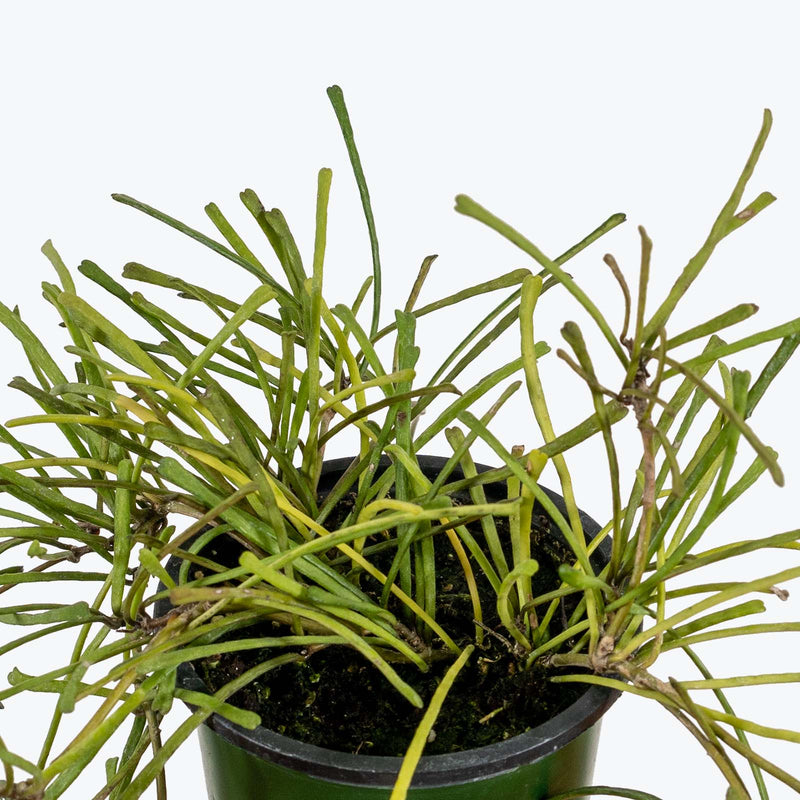
How to care for Hoya Retusa
They should not be in a position to see the sun directly, although early morning or late evening sun is fine. Filtered sunlight through a sheer curtain is best and most homes are comprised primarily of indirect sunlight. The best spot for them is where they do not see the sun during the majority of the day but still get bright, indirect light.
They will do well in medium light but will grow faster with brighter light. A good medium-light place in your home would be in the middle of a room that has a regular size window. Remember that plants will grow based on how much light they receive.
They like the soil to be relatively dry before the next watering. That usually takes about 2 weeks in an average home environment. It will vary depending on the time of year, your environment and lighting conditions, but for them, it's always safer to underwater or water when you see signs of lack of water (i.e. droopy, floppy, or soft leaves). Expect to water more often in brighter light and less often in lower light.
They will do well in average humidity environments but will appreciate a little bit of humidity if provided, give them a mist daily or get a humidifier.
Hang your Hoya at a level where it will still get bright light at the top of the plant; otherwise, it will start to look bald. Reduce the frequency of watering during the winter months as the days are much shorter and typically overcast (i.e. darker).
You can feel comfortable having this plant around your home in the potential case where your pet feels like nibbling on it. However, we typically recommend keeping your pets from eating any of your houseplants..
Learn MoreView PlantHoya Rosita
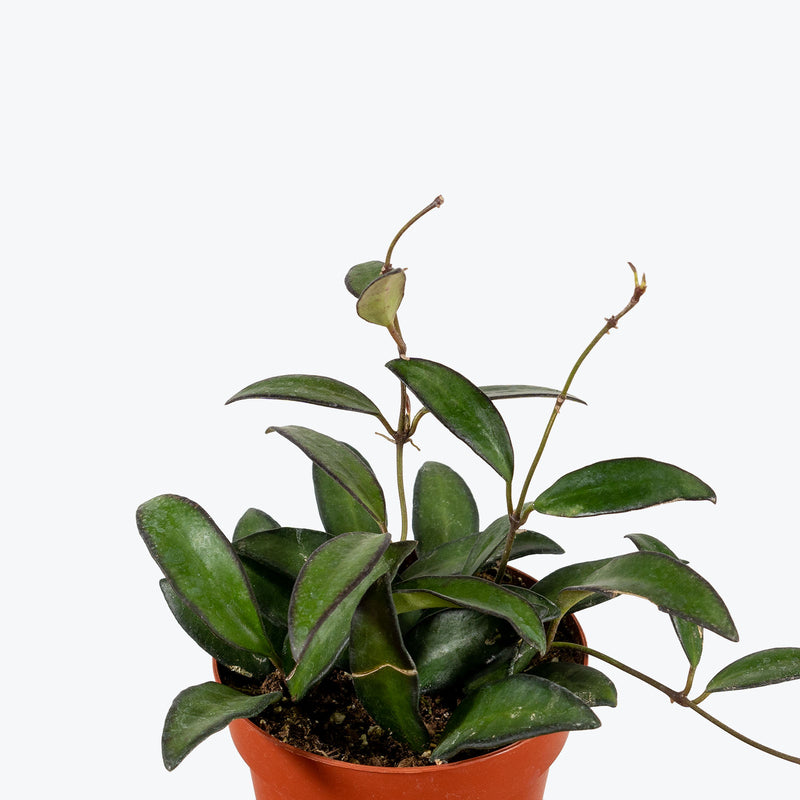
How to care for Hoya Rosita
They should not be in a position to see the sun directly, although early morning or late evening sun is fine. Filtered sunlight through a sheer curtain is best and most homes are comprised primarily of indirect sunlight. The best spot for them is where they do not see the sun during the majority of the day but still get bright, indirect light.
They will do well in medium light but will grow faster with brighter light. A good medium-light place in your home would be in the middle of a room that has a regular size window. Remember that plants will grow based on how much light they receive.
They like the soil to be relatively dry before the next watering. That usually takes about 2 weeks in an average home environment. It will vary depending on the time of year, your environment and lighting conditions, but for them, it's always safer to underwater or water when you see signs of lack of water (i.e. droopy, floppy, or soft leaves). Expect to water more often in brighter light and less often in lower light.
They can live in any average home humidity condition and are fairly hardy.
Hoya Rosita loves to bath in bright indirect sunlight, and the more exposure it receives, the more vibrant the leaves become. Direct exposure to the morning sun can heighten the red and pink tones, but intense afternoon sunlight can scorch the leaves!
You can feel comfortable having this plant around your home in the potential case where your pet feels like nibbling on it. However, we typically recommend keeping your pets from eating any of your houseplants..
Learn MoreView PlantHoya Sarawak

How to care for Hoya Sarawak
Hoya Sarawak should not be in a position to see the sun directly, although early morning or late evening sun is fine. Filtered sunlight through a sheer curtain is best and most homes are comprised primarily of indirect sunlight. The best spot for them is where they do not see the sun during the majority of the day but still get bright, indirect light.
Hoya Sarawak will thrive in bright light, but also can tolerate medium light. A good medium-light place in your home would be in the middle of a room that has a regular size window. They can be placed anywhere between the middle of the room and the window. Remember that plants will grow based on how much light they receive.
Hoya Sarawak likes the soil to be relatively dry before the next watering. That usually takes about 2 weeks in an average home environment. It will vary depending on the time of year, your environment and lighting conditions, but for them, it's always safer to underwater or water when you see signs of lack of water (i.e. droopy, floppy, or soft leaves). Expect to water more often in brighter light and less often in lower light.
Hoya Sarawak will do well in average humidity environments but will appreciate a little bit of humidity if provided, give them a mist daily or get a humidifier.
Provide a support structure such as a trellis or wire frame to encourage Hoya Sarawak climbing. Regularly check for pests like aphids, mealybugs, and spider mites. Prune as needed to control growth and encourage bushier, more compact development. Reduce feeding during the winter months.
You can feel comfortable having Hoya Sarawak around your home in the potential case where your pet feels like nibbling on it. However, we typically recommend keeping your pets from eating any of your houseplants..
Learn MoreView PlantHoya Shepherdii
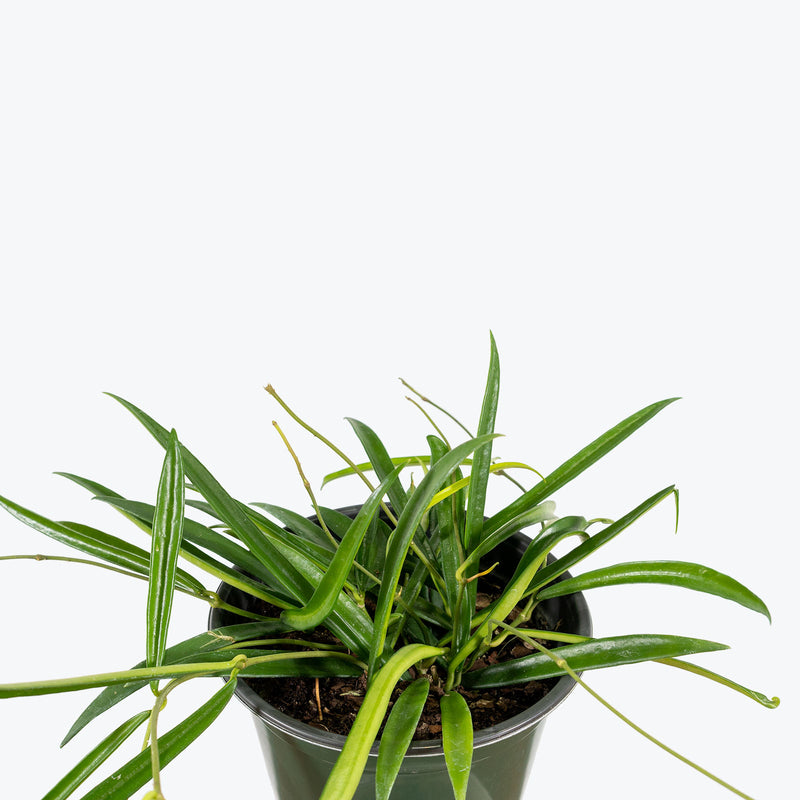
How to care for Hoya Shepherdii
They should not be in a position to see the sun directly, although early morning or late evening sun is fine. Filtered sunlight through a sheer curtain is best and most homes are comprised primarily of indirect sunlight. The best spot for them is where they do not see the sun during the majority of the day but still get bright, indirect light.
They will thrive in medium to bright light, but also can tolerate low light. A good medium-light place in your home would be in the middle of a room that has a regular size window. They can be placed almost anywhere in the room but remember, plants will grow based on how much light they receive.
They like the soil to be relatively dry before the next watering. That usually takes about 2 weeks in an average home environment. It will vary depending on the time of year, your environment and lighting conditions, but for them, it's always safer to underwater or water when you see signs of lack of water (i.e. droopy, floppy, or soft leaves). Expect to water more often in brighter light and less often in lower light.
They will do well in average humidity environments but will appreciate a little bit of humidity if provided, give them a mist daily or get a humidifier.
When Hoya's are "stressed," which can happen when they are not given enough water or receive too much sun or bright light, they can have some stunning reactions. If you want your plant to bloom, keep the soil dry and keep it in very bright light.
You can feel comfortable having this plant around your home in the potential case where your pet feels like nibbling on it. However, we typically recommend keeping your pets from eating any of your houseplants..
Learn MoreView PlantHoya Sigillatis
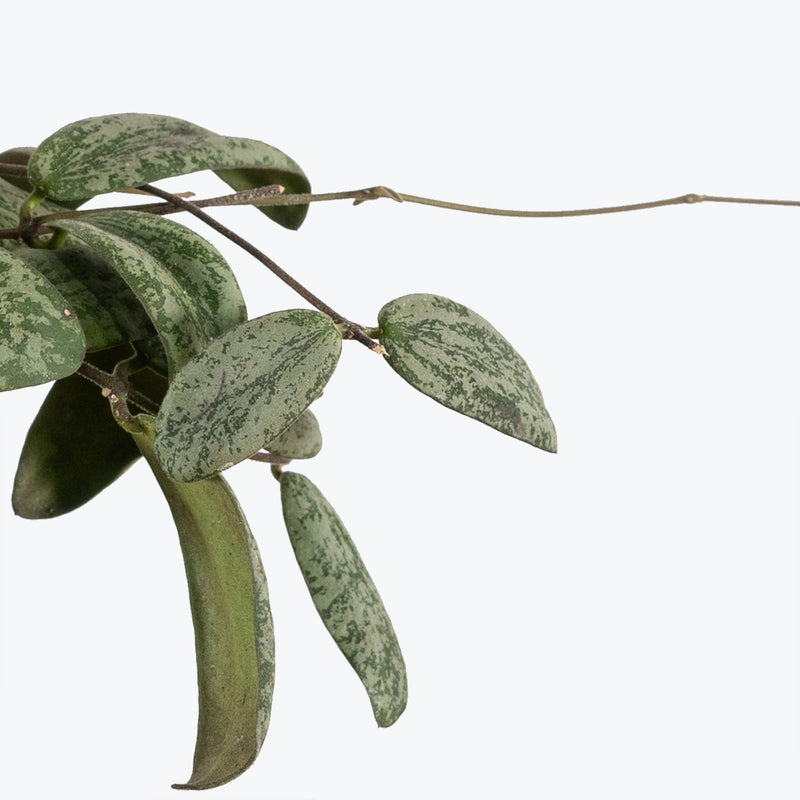
How to care for Hoya Sigillatis
They should not be in a position to see the sun directly, although early morning or late evening sun is fine. Filtered sunlight through a sheer curtain is best and most homes are comprised primarily of indirect sunlight. The best spot for them is where they do not see the sun during the majority of the day but still get bright, indirect light.
They will thrive in bright light, but also can tolerate medium light. A good medium-light place in your home would be in the middle of a room that has a regular size window. They can be placed anywhere between the middle of the room and the window. Remember that plants will grow based on how much light they receive.
They like the soil to be relatively dry before the next watering. That usually takes about 2 weeks in an average home environment. It will vary depending on the time of year, your environment and lighting conditions, but for them, it's always safer to underwater or water when you see signs of lack of water (i.e. droopy, floppy, or soft leaves). Expect to water more often in brighter light and less often in lower light.
They will do well in average humidity environments but will appreciate a little bit of humidity if provided, give them a mist daily or get a humidifier.
Hoya Sigillatis is a relatively easy-going plant that doesn't require frequent repotting. A well-draining soil mix is essential to prevent water-logging. It can be a slow grower, but with optimal conditions, it can be a robust climber.
You can feel comfortable having this plant around your home in the potential case where your pet feels like nibbling on it. However, we typically recommend keeping your pets from eating any of your houseplants..
Learn MoreView PlantHoya Sunrise
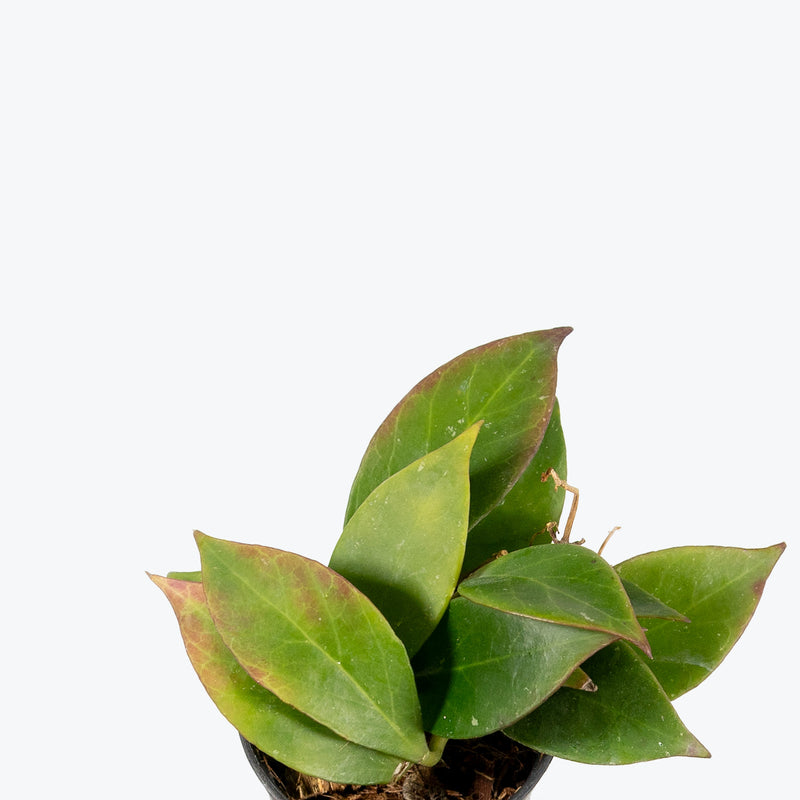
How to care for Hoya Sunrise
Hoya Sunrise should not be in a position to see the sun directly, although early morning or late evening sun is fine. Filtered sunlight through a sheer curtain is best and most homes are comprised primarily of indirect sunlight. The best spot for them is where they do not see the sun during the majority of the day but still get bright, indirect light.
Hoya Sunrise will do well in medium light but will grow faster with brighter light. A good medium-light place in your home would be in the middle of a room that has a regular size window. Remember that plants will grow based on how much light they receive.
Hoya Sunrise likes the soil to be relatively dry before the next watering. That usually takes about 2 weeks in an average home environment. It will vary depending on the time of year, your environment and lighting conditions, but for them, it's always safer to underwater or water when you see signs of lack of water (i.e. droopy, floppy, or soft leaves). Expect to water more often in brighter light and less often in lower light.
Hoya Sunrise can live in any average home humidity condition and are fairly hardy.
Hoya Sunrise loves bathing in bright, indirect sunlight. The more exposure it gets, the more vibrant its leaves become. Morning sun can heighten the red and pink tones, but intense afternoon sunlight can scorch them.
You can feel comfortable having Hoya Sunrise around your home in the potential case where your pet feels like nibbling on it. However, we typically recommend keeping your pets from eating any of your houseplants..
Learn MoreView PlantHoya Vitellinoides
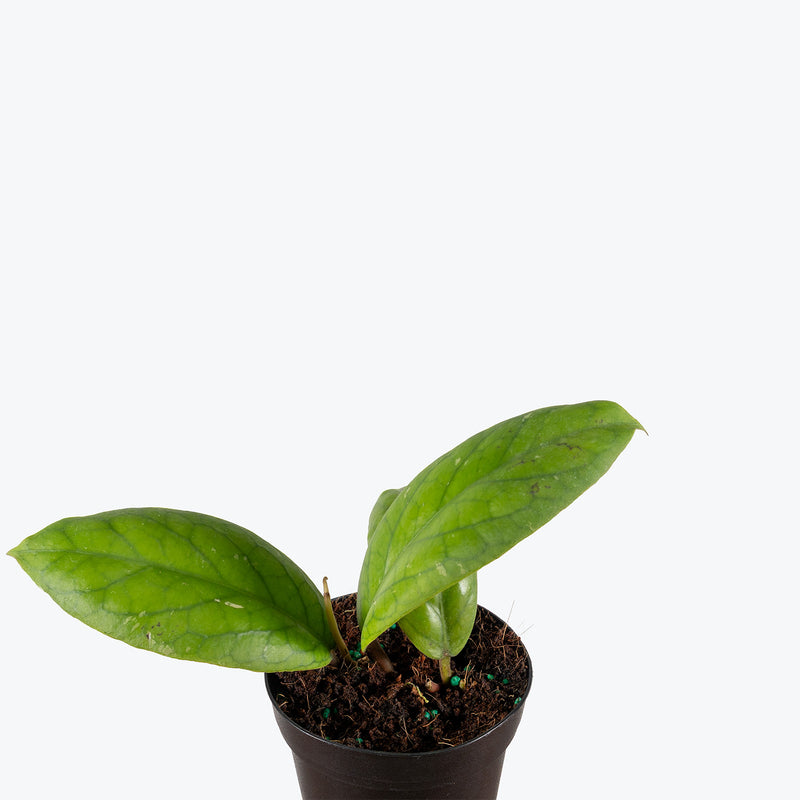
How to care for Hoya Vitellinoides
Hoya Vitellinoides should not be in a position to see the sun directly, although early morning or late evening sun is fine. Filtered sunlight through a sheer curtain is best and most homes are comprised primarily of indirect sunlight. The best spot for them is where they do not see the sun during the majority of the day but still get bright, indirect light.
Hoya Vitellinoides will thrive in bright light, but also can tolerate medium light. A good medium-light place in your home would be in the middle of a room that has a regular size window. They can be placed anywhere between the middle of the room and the window. Remember that plants will grow based on how much light they receive.
Hoya Vitellinoides likes the soil to be relatively dry before the next watering. That usually takes about 2 weeks in an average home environment. It will vary depending on the time of year, your environment and lighting conditions, but for them, it's always safer to underwater or water when you see signs of lack of water (i.e. droopy, floppy, or soft leaves). Expect to water more often in brighter light and less often in lower light.
Hoya Vitellinoides will do well in average humidity environments but will appreciate a little bit of humidity if provided, give them a mist daily or get a humidifier.
Provide a well-draining, chunky soil mix such as orchid bark and perlite. Train Hoya Vitellinoides on a trellis or moss pole to support climbing growth. Fertilize monthly in the growing season with a diluted balanced or foliage-focused fertilizer. Rotate the pot occasionally for even growth.
You can feel comfortable having Hoya Vitellinoides around your home in the potential case where your pet feels like nibbling on it. However, we typically recommend keeping your pets from eating any of your houseplants..
Learn MoreView PlantHoya Wayetii
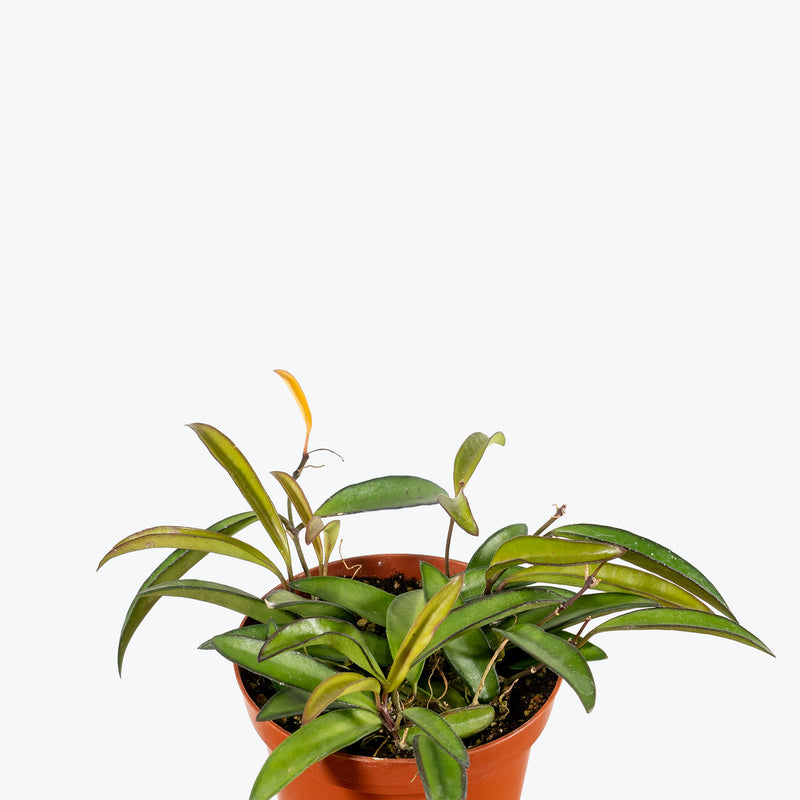
How to care for Hoya Wayetii
They should not be in a position to see the sun directly, although early morning or late evening sun is fine. Filtered sunlight through a sheer curtain is best and most homes are comprised primarily of indirect sunlight. The best spot for them is where they do not see the sun during the majority of the day but still get bright, indirect light.
They will thrive in bright light, but also can tolerate medium light. A good medium-light place in your home would be in the middle of a room that has a regular size window. They can be placed anywhere between the middle of the room and the window. Remember that plants will grow based on how much light they receive.
They like the soil to be relatively dry before the next watering. That usually takes about 2 weeks in an average home environment. It will vary depending on the time of year, your environment and lighting conditions, but for them, it's always safer to underwater or water when you see signs of lack of water (i.e. droopy, floppy, or soft leaves). Expect to water more often in brighter light and less often in lower light.
They will do well in average humidity environments but will appreciate a little bit of humidity if provided, give them a mist daily or get a humidifier.
When Hoya's are "stressed," which can happen when they are not given enough water or receive too much sun or bright light, they can have some stunning reactions. If you want your plant to bloom, keep the soil dry and keep it in very bright light.
You can feel comfortable having this plant around your home in the potential case where your pet feels like nibbling on it. However, we typically recommend keeping your pets from eating any of your houseplants..
Learn MoreView PlantHoya Wayetii Tricolor

How to care for Hoya Wayetii Tricolor
Hoya Wayetii Tricolor should not be in a position to see the sun directly, although early morning or late evening sun is fine. Filtered sunlight through a sheer curtain is best and most homes are comprised primarily of indirect sunlight. The best spot for them is where they do not see the sun during the majority of the day but still get bright, indirect light.
Hoya Wayetii Tricolor will thrive in bright light, but also can tolerate medium light. A good medium-light place in your home would be in the middle of a room that has a regular size window. They can be placed anywhere between the middle of the room and the window. Remember that plants will grow based on how much light they receive.
Hoya Wayetii Tricolor likes the soil to be relatively dry before the next watering. That usually takes about 2 weeks in an average home environment. It will vary depending on the time of year, your environment and lighting conditions, but for them, it's always safer to underwater or water when you see signs of lack of water (i.e. droopy, floppy, or soft leaves). Expect to water more often in brighter light and less often in lower light.
Hoya Wayetii Tricolor will do well in average humidity environments but will appreciate a little bit of humidity if provided, give them a mist daily or get a humidifier.
When Hoyas are "stressed," which can happen when they are not given enough water or receive too much sun or bright light, they can have some stunning reactions. If you want Hoya Wayetii Tricolor to bloom, keep the soil dry and keep it in very bright light. During the winter, reduce fertilization as the plant's growth slows down. Regular pruning can help maintain the shape of the plant and encourage fuller growth. Provide a support structure for climbing or allow it to trail naturally.
You can feel comfortable having Hoya Wayetii Tricolor around your home in the potential case where your pet feels like nibbling on it. However, we typically recommend keeping your pets from eating any of your houseplants..
Learn MoreView PlantHuernia Schneideriana
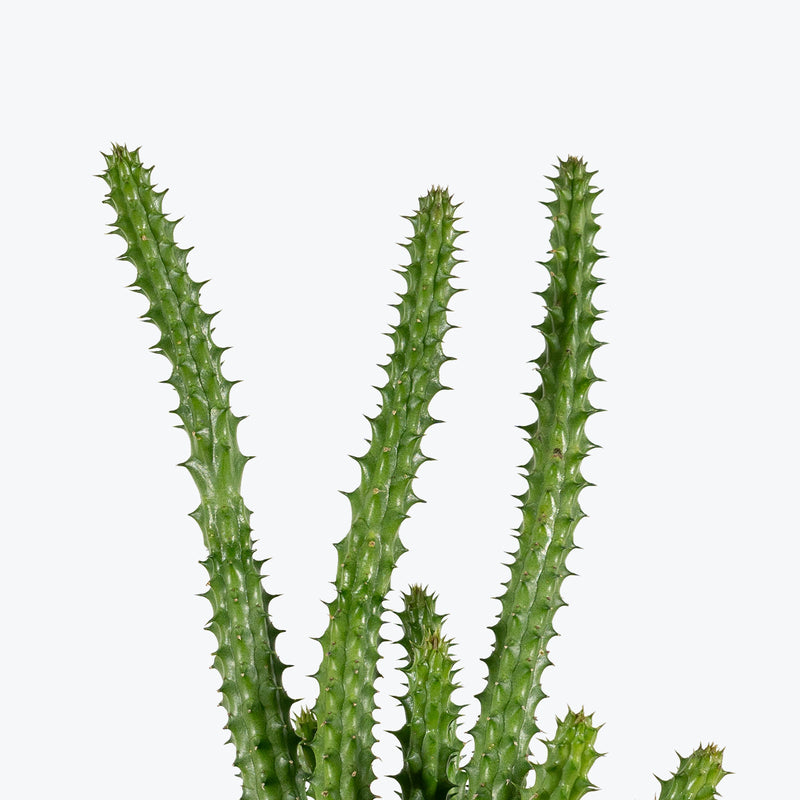
How to care for Huernia Schneideriana
Huernia Schneideriana should not be in a position to see the sun directly, although early morning or late evening sun is fine. Filtered sunlight through a sheer curtain is best and most homes are comprised primarily of indirect sunlight. The best spot for them is where they do not see the sun during the majority of the day but still get bright, indirect light.
Huernia Schneideriana will thrive in bright light, but also can tolerate medium light. A good medium-light place in your home would be in the middle of a room that has a regular size window. They can be placed anywhere between the middle of the room and the window. Remember that plants will grow based on how much light they receive.
Huernia Schneideriana likes the soil to be completely dry before the next watering. That usually takes about 4 weeks in an average home environment. It will vary depending on the time of year, your environment and lighting conditions, but for them, it's always safer to underwater or water when you see signs of lack of water (i.e. wrinkly or soft leaves). Water a little more often in the warmer months.
Their humidity requirement is low, so do not mist Huernia Schneideriana or put them in an enclosed terrarium.
Huernia Schneideriana is a hardy plant, making it suitable for both novice and experienced plant enthusiasts. Its green stems are capable of photosynthesis, allowing it to survive in areas with less light. However, to maintain its health and appearance, it's essential to provide it with the right amount of light and water.
Huernia Schneideriana is moderately toxic and can cause some adverse reactions when ingested so it is best to not let your pets eat it, which we advise for all plants in general. The severity of the reaction will depend on how much of the plant is ingested but, if you know your pet typically does not eat your plants, this plant will be suitable for your home..
View PlantHydnophytum Papuanum Ant Plant
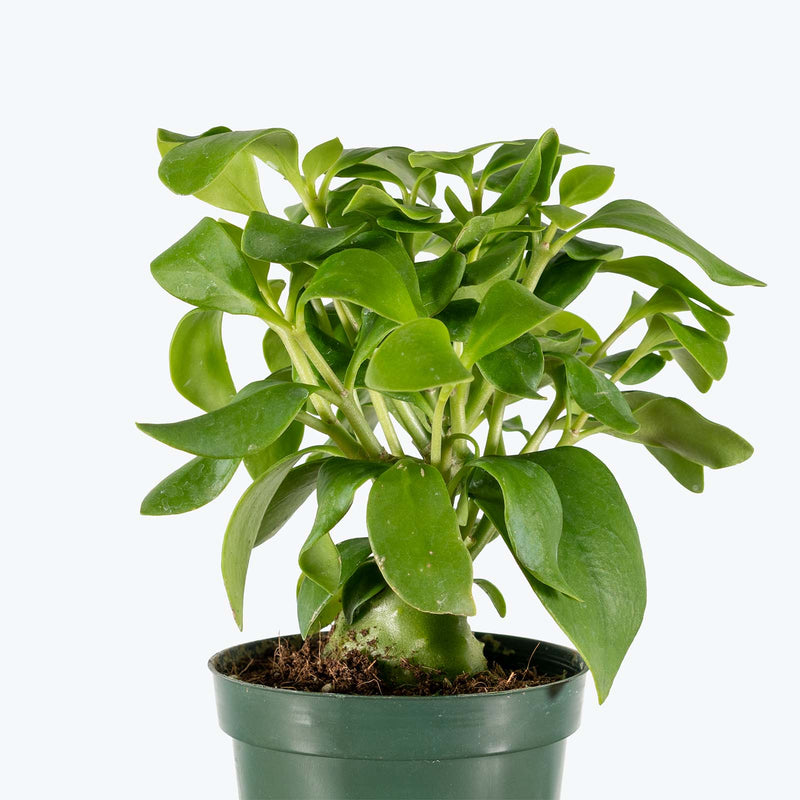
How to care for Hydnophytum Papuanum Ant Plant
Hydnophytum Papuanum Ant Plant should not be in a position to see the sun directly, although early morning or late evening sun is fine. Filtered sunlight through a sheer curtain is best and most homes are comprised primarily of indirect sunlight. The best spot for them is where they do not see the sun during the majority of the day but still get bright, indirect light.
Hydnophytum Papuanum Ant Plant will thrive in bright light, but also can tolerate medium light. A good medium-light place in your home would be in the middle of a room that has a regular size window. They can be placed anywhere between the middle of the room and the window. Remember that plants will grow based on how much light they receive.
Hydnophytum Papuanum Ant Plant likes the soil to be relatively dry before the next watering. That usually takes about 2 weeks in an average home environment. It will vary depending on the time of year, your environment and lighting conditions, but for them, it's always safer to underwater or water when you see signs of lack of water (i.e. droopy, floppy, or soft leaves). Expect to water more often in brighter light and less often in lower light.
Hydnophytum Papuanum Ant Plant will do well in average humidity environments but will appreciate a little bit of humidity if provided, give them a mist daily or get a humidifier.
Use a well-draining, chunky mix, such as orchid bark blended with perlite and peat, to mimic its natural epiphytic conditions. Hydnophytum Papuanum Ant Plant can also be mounted on wood like an air plant for a striking display. Fertilize lightly every 4–6 weeks during spring and summer. Avoid letting water pool around the caudex—always water the soil or growing medium directly.
You can feel comfortable having Hydnophytum Papuanum Ant Plant around your home in the potential case where your pet feels like nibbling on it. However, we typically recommend keeping your pets from eating any of your houseplants..
View PlantHydrangea Macrophylla
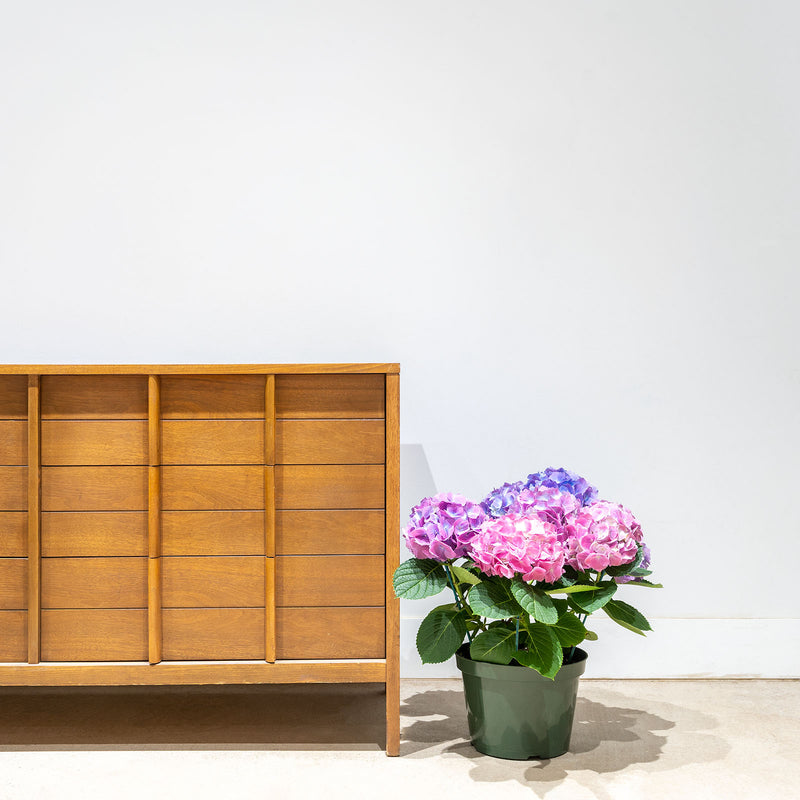
How to care for Hydrangea Macrophylla
They enjoy some direct sun, but they'll also do well in bright, indirect light. It is best to place this plant somewhere where it will receive some nice morning sun, or a couple hours of afternoon sun, and then indirect light the rest of the day.
They will thrive in bright light, but also can tolerate medium light. A good medium-light place in your home would be in the middle of a room that has a regular size window. They can be placed anywhere between the middle of the room and the window. Remember that plants will grow based on how much light they receive.
They need to be watered when the top half of the soil is dry to the touch. That usually takes about 1 week in an average home environment. It will vary depending on the time of year, your environment and lighting conditions, but it's always safer to underwater or give the soil a check before you water again. Expect to water more often in brighter light and less often in lower light.
They can live in any average home humidity condition and are fairly hardy.
They grow best in locations that get afternoon shade and protection from the sun. During very hot periods, the plants may need watered every day. It’s best to prune them after flowering in July or early August.
This plant is moderately toxic and can cause some adverse reactions when ingested so it is best to not let your pets eat it, which we advise for all plants in general. The severity of the reaction will depend on how much of the plant is ingested but, if you know your pet typically does not eat your plants, this plant will be suitable for your home..
View Plant